Picturesque domestic flight on Widerøe's DHC-8-100 in western Norway
Flight routing
- 1
- 2Widerøe - WF163 - Ørsta (HOV) to Bergen (BGO) - DHC-8-100
- 3
Flight Background:
Hello Flight-Report community,
This is my second flight report on my dream trip to Norway in July, 2025. After travelling on SAS SK4610 to Oslo, I had a lovely 3.5-day stay in this liveable and walkable capital city in rare sunny weather. I then had a memorising ten-day roadtrip in the regions of Innlandet, Vestland and Møre og Romsdal in eastern and western Norway in a rental electric sedan. After visiting the Atlanterhavsveien scenic road and the art nouveau town of Ålesund, my next destination on my itinerary was Bergen. I had decided to travel to this historic port city by domestic flight after returning my car.
Please refer to this link for my review on this trip's first flight, SAS SK4610 from Manchester (MAN) to Oslo (OSL): https://flight-report.com/en/report/74003/sas-sk4610-manchester-man-oslo-osl/
Flight Selection:
Many regional and rural towns in the western and northern parts of Norway, including those remote communities in the tricky terrain of Arctic Circle, are only connected by Norway's iconic airline, Widerøe. The below route map shows its vast network which heavily focuses on domestic routes. Some of them are under the public service obligation (PSO) agreement subsidised by the Norwegian government to provide vital linkage to rural areas. Some routes in northern Norway are even operated as multi-stop milk-run flights.
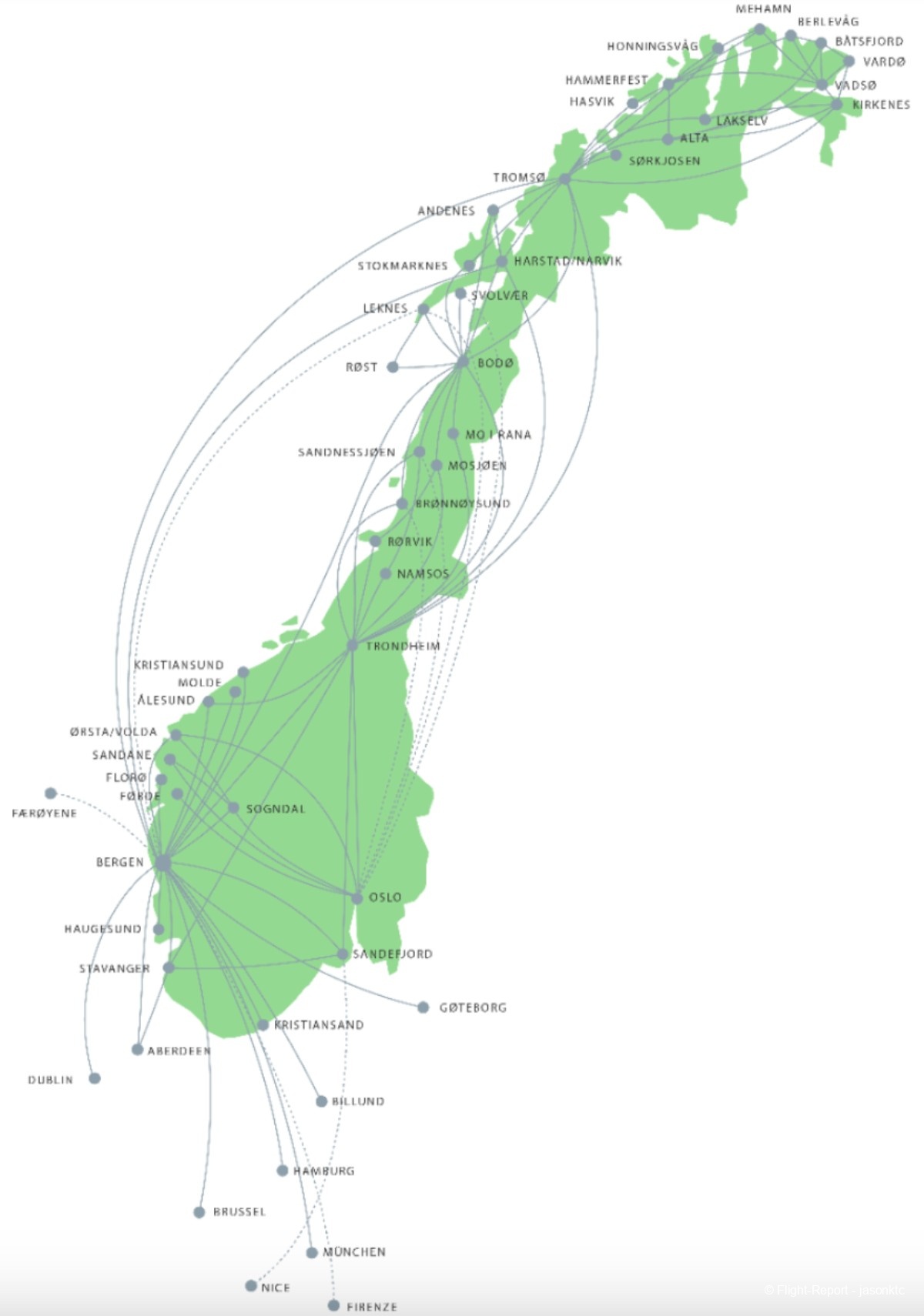
Widerøe's fleet is mainly consisted of DeHavilland Dash 8 turboprops with the exception of three Embraer E190-E2 jet planes. It is in fact the largest DHC-8-100 operator in the world, so Widerøe is the best option if you want to expereince this relatively rare type of plane.
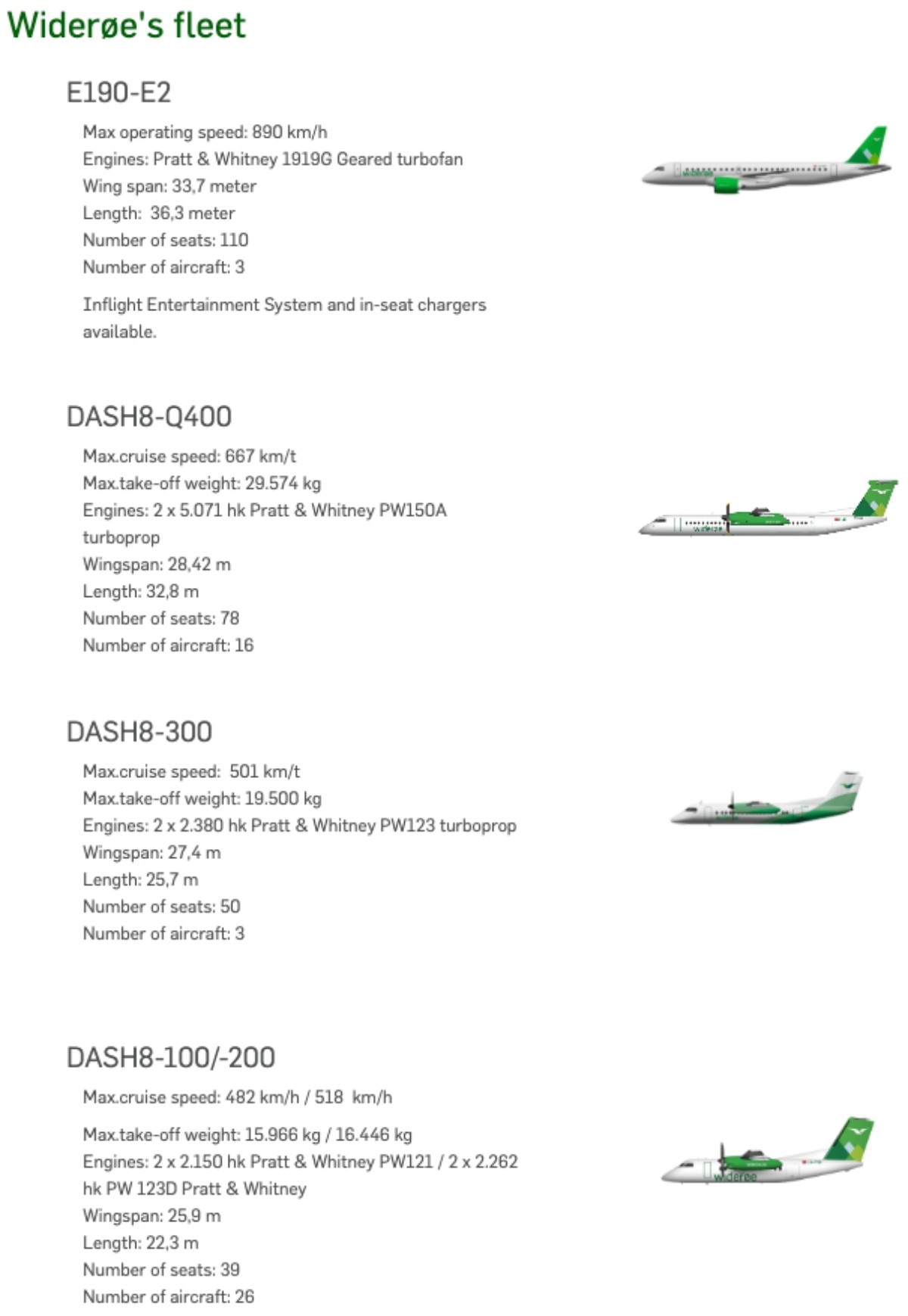
Flight Purchasing:
I could originally select a flight from Ålesund (AES) to Bergen (BGO) which runs in four to five daily. But all of them are operated by Dash 8-Q400. Coincidentally, just a 1.5-hour drive from Ålesund, the regional airport of Ørsta–Volda (HOV) has a daily flight to Bergen which is flown by Widerøe's DHC-8-100. More importantly, there is also a Hertz rental office located at HOV. I immediately seized this opportunity to experience the quirky and fascinating DHC-8-100.
The one-way ticket cost me GBP 80.4. I had selected Smart class which includes one personal item+ one carry-on bag (max 8kg in total) and one checked baggage (max 23kg).
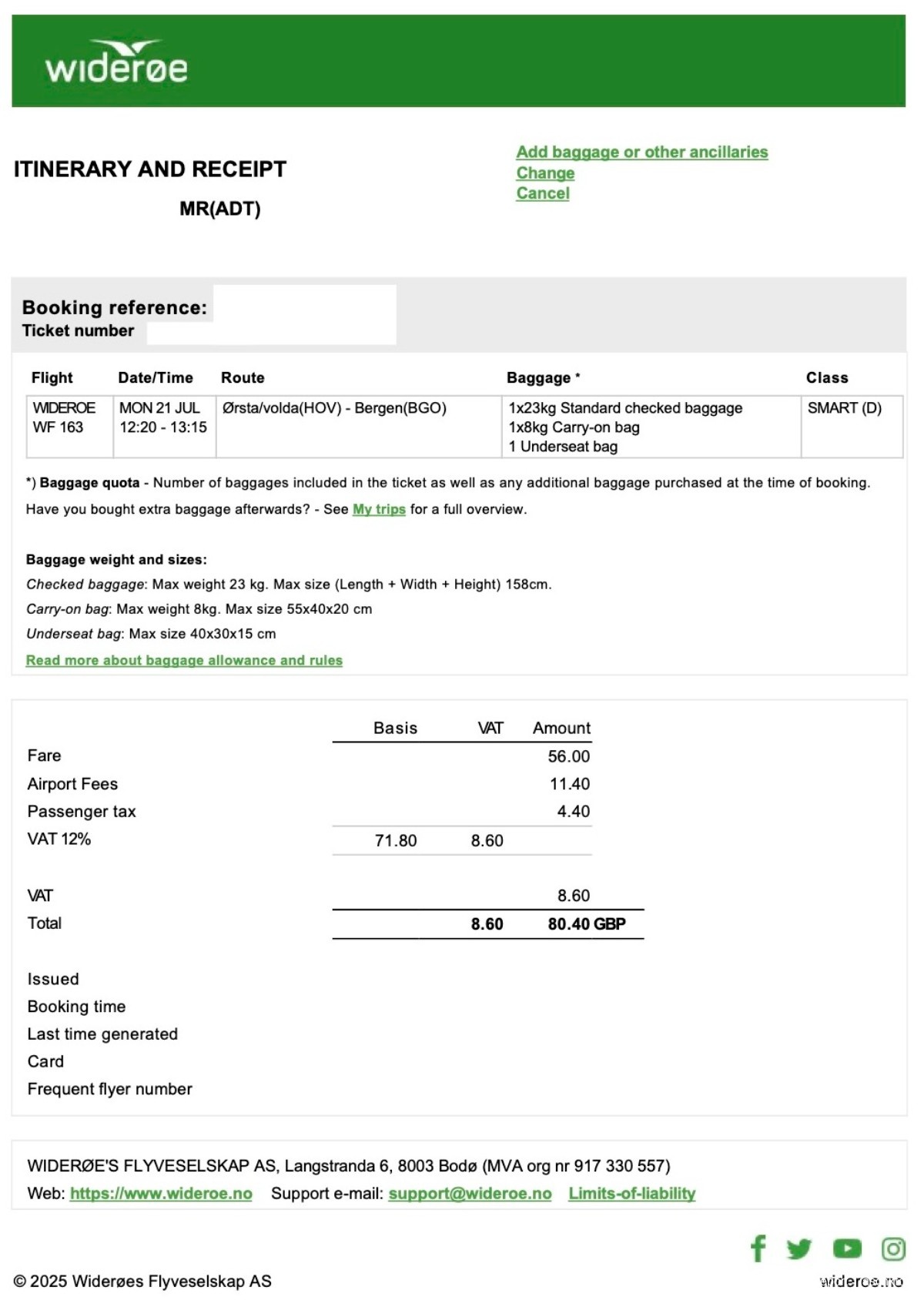
Widerøe offers four types of ticket. Be aware that there may be some price differences or discount offers on the airline's PSO routes.
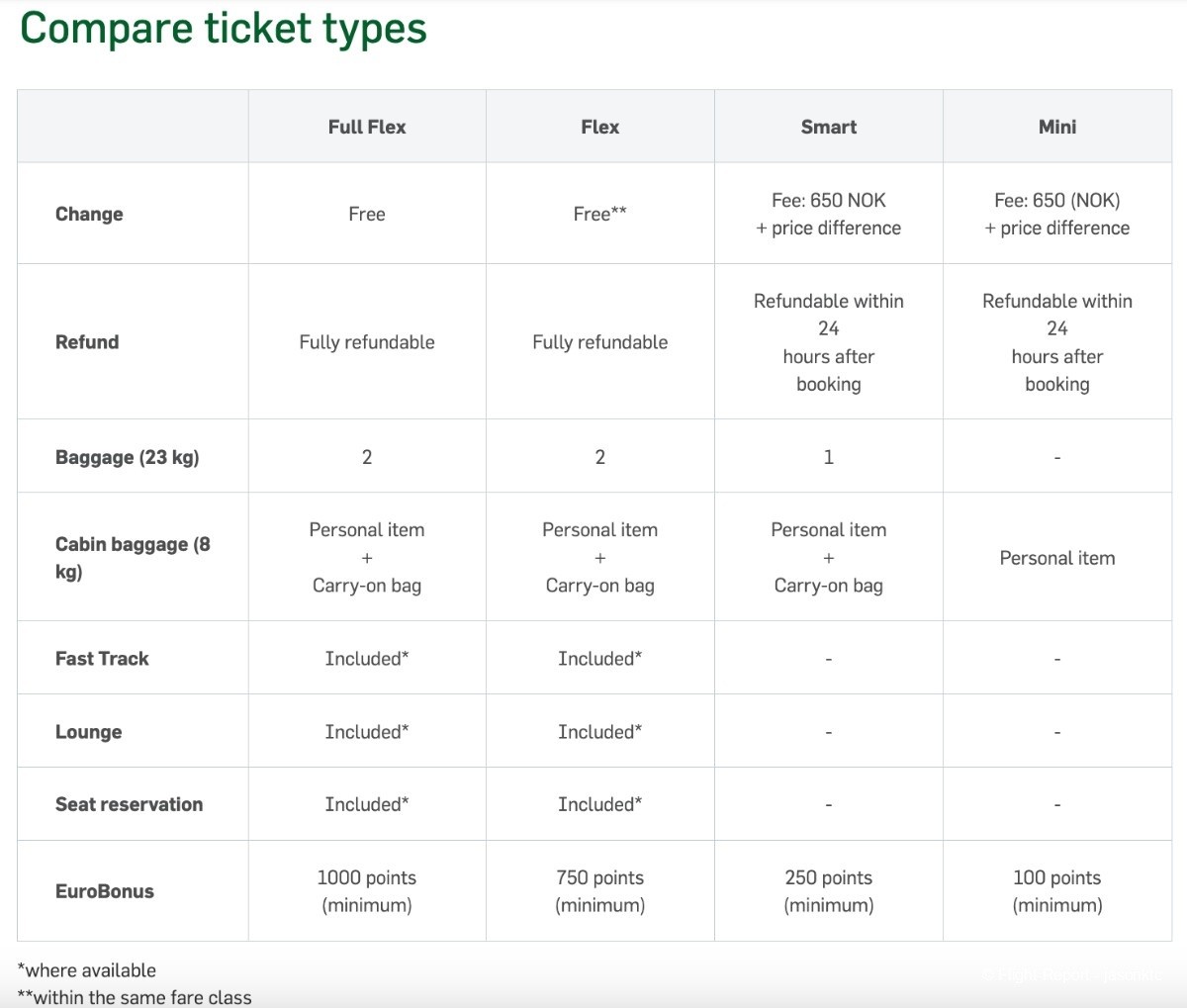
Getting to HOV:
Aforementioned, I stayed at Ålesund the night before my flight. I had to drive approximately 1.5-hour to HOV to return my rental car and catch my flight. I left the hotel at around 08:45 and took the E136 and E39 highway. A car ferry is required on this stretch of the E39 between Solavågen and Festøya. As E39 is a key highway in western Norway, the car ferry runs 24 hours. In daytime, the car ferry runs every 30 minutes (every 10, 40) and the journey takes about 20 minutes.
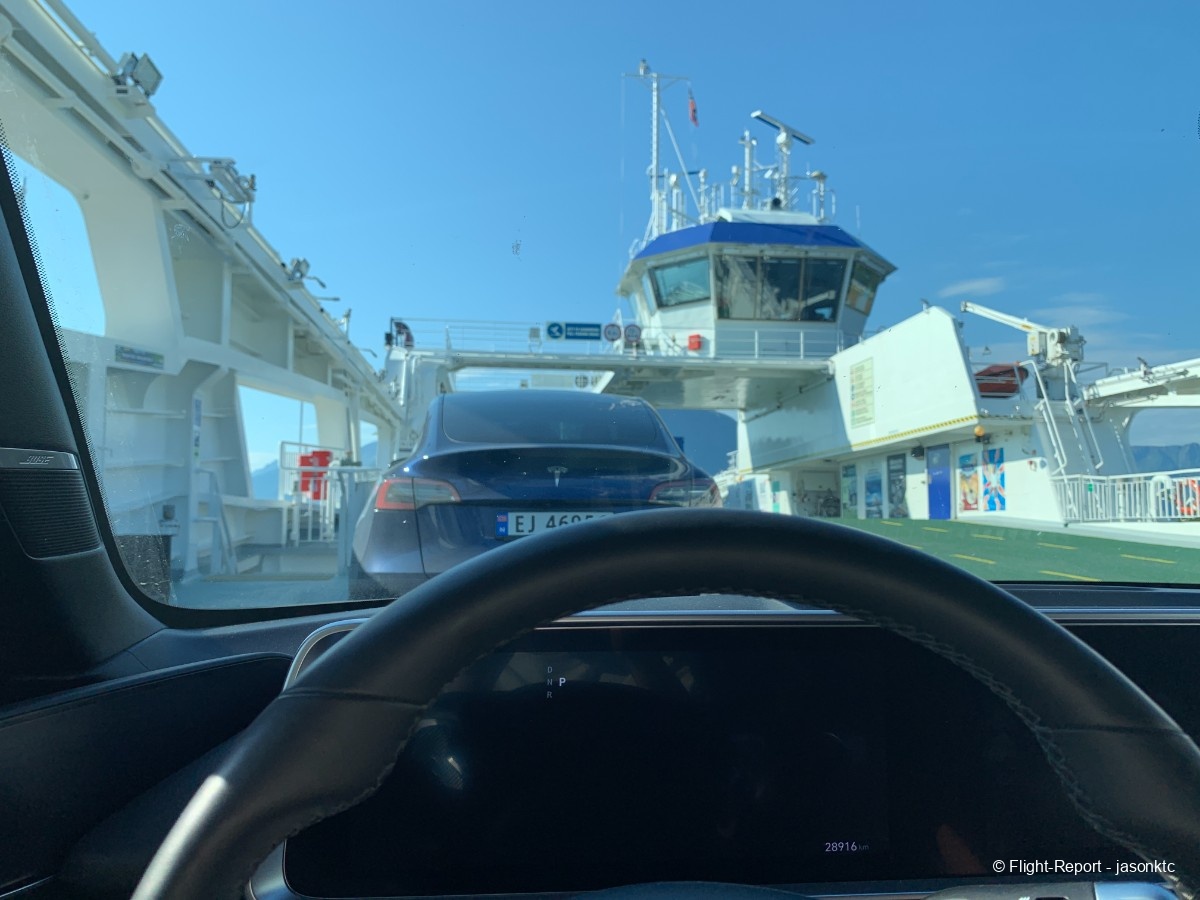
Norway has a vast and well-developed network of car ferry integrated into its road network to shorten journey time across fjords and waterways. Car ferry is very common and essential if you are going on a roadtrip in Norway. I took seven car ferries during my ten-day roadtrip, and I found the car ferry to be punctual and frequent. The payment is usually handled by a toll-road tag on your car's windscreen and is usually paid after your rental.
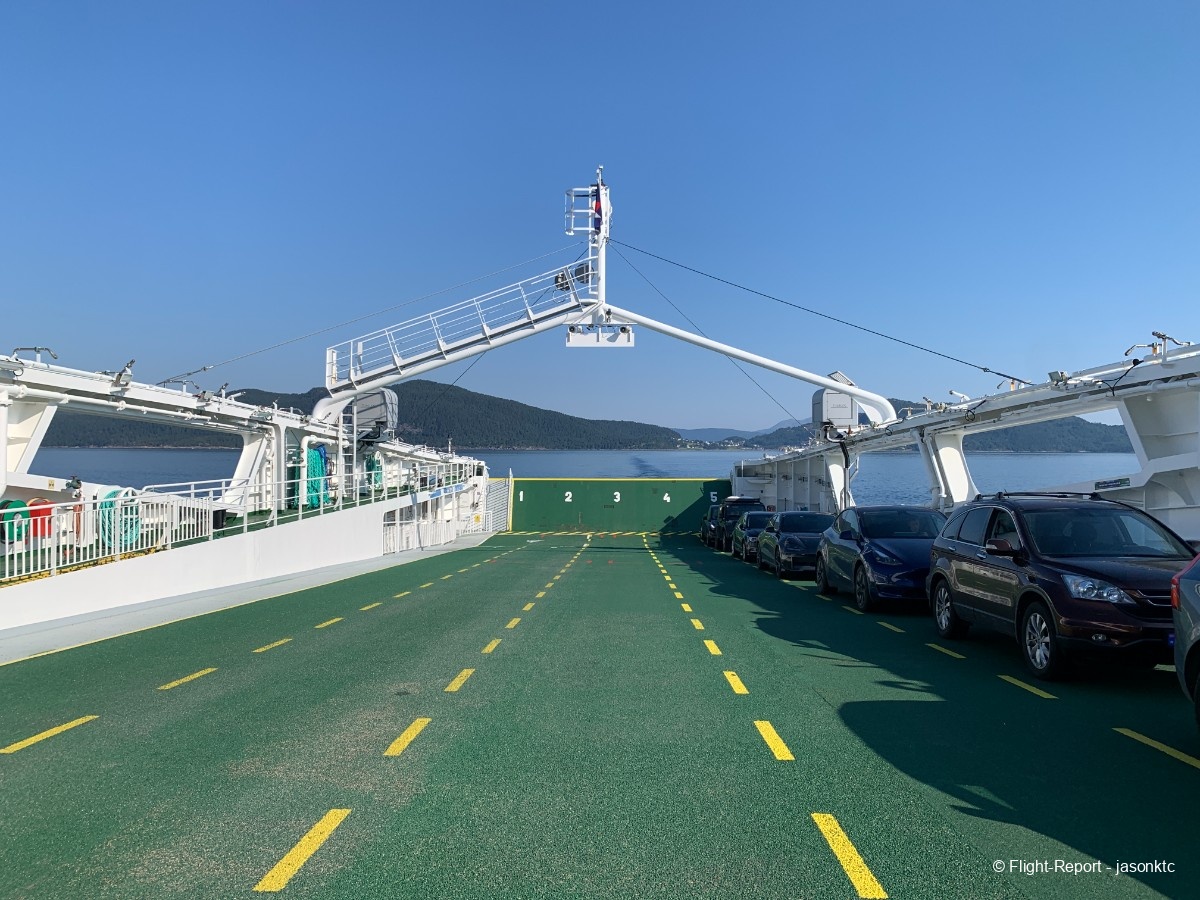
The car ferry rides are very scenic and idyllic, especially when navigating through amazing fjords. Many ferries are electric-powered which make the journey even more quiet and peaceful. The below photo is the view on the Solavågen to Festøya ferry that I took when going to HOV.
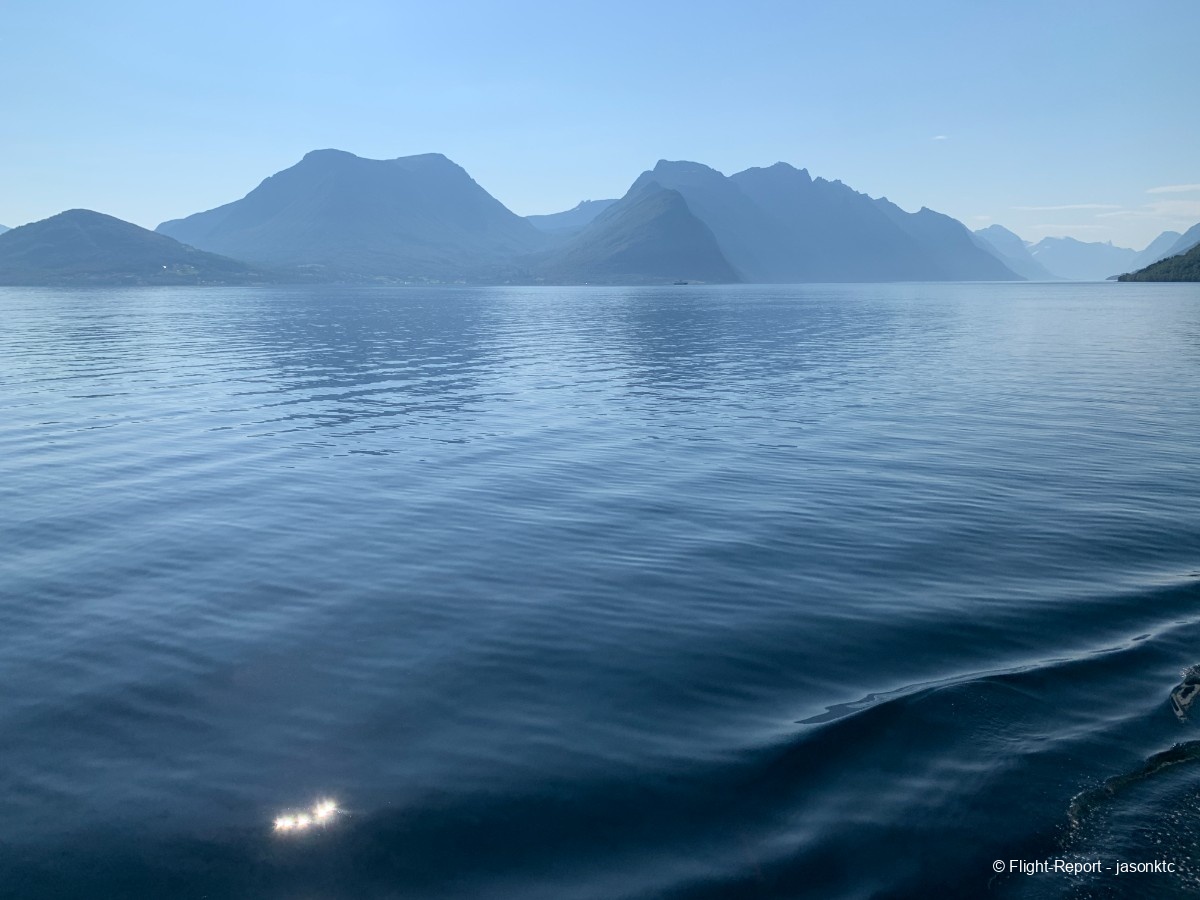
I bade farewell to my comfortable and refined Hyundai Ioniq 6 electric car at the carpark just outside HOV's terminal. It had left me a good impression on my first experience on electric vehicles.
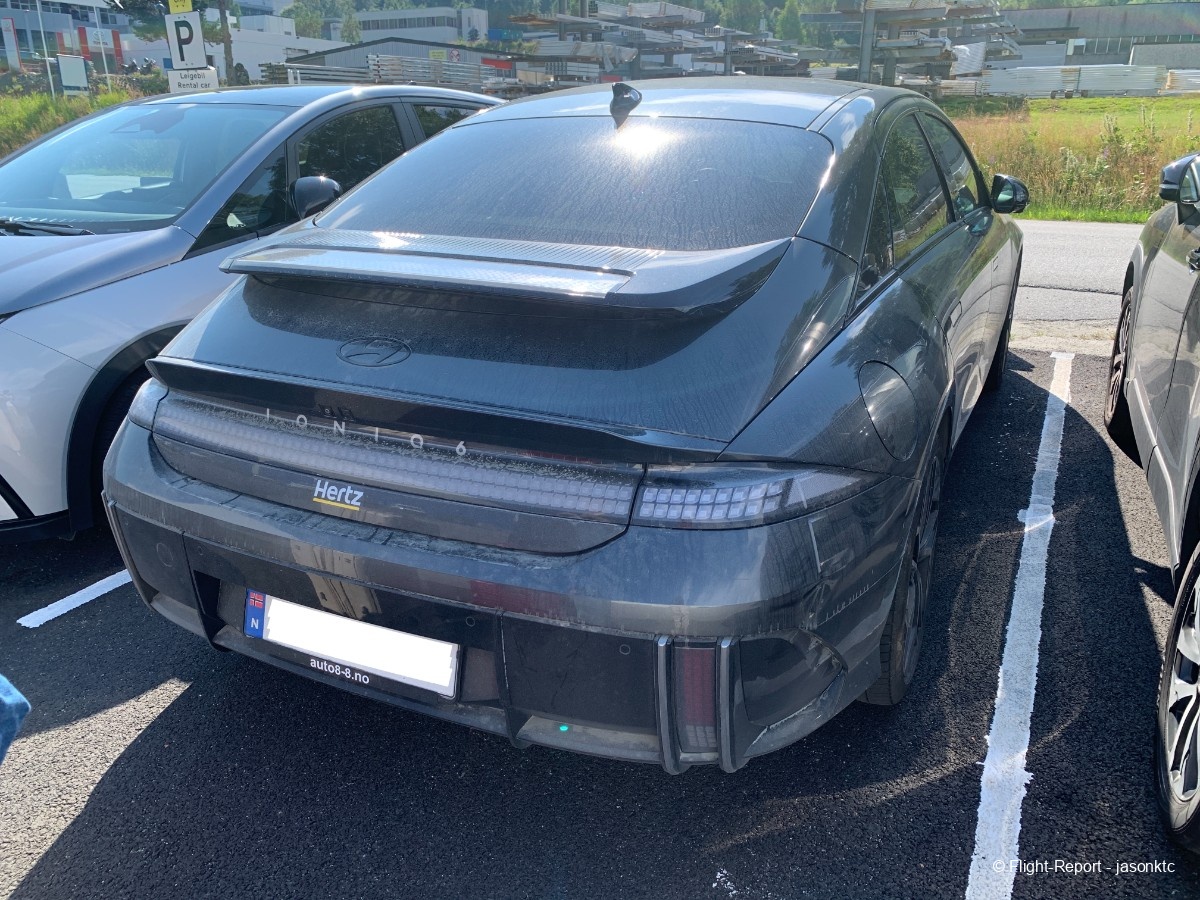
Check-in at HOV:
HOV is a small regional airport that handles about 10 departures and arrivals per day. It only has one terminal and the car park is conveniently located just outside the terminal building. I think it is also connected with nearby towns by the local or municipal bus services.
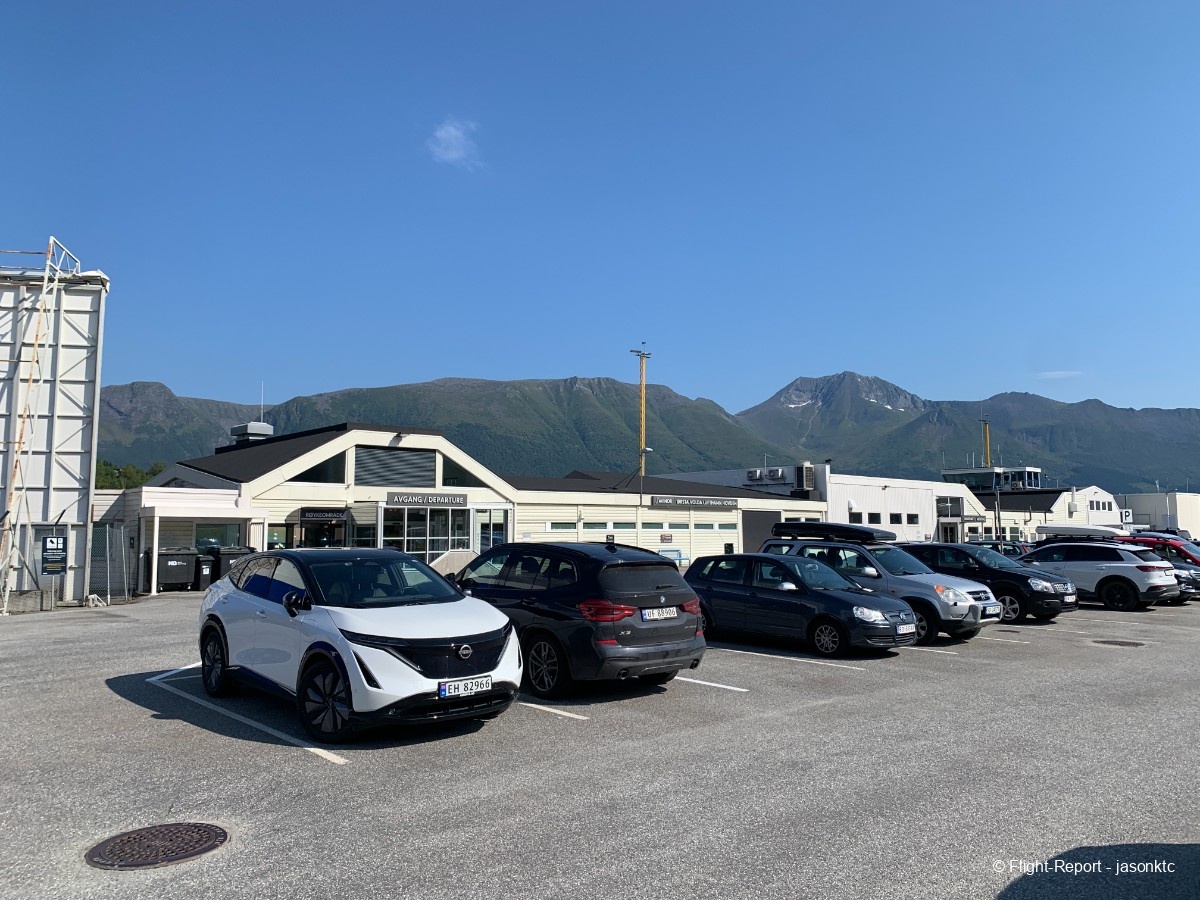
Once entered the terminal, the check-in area is only few steps away. There is only one staffed counter as it is not a busy airport. Interestingly, checked baggages are not put on conveyor belt like most other airports. Instead, I was asked to carry my own checked baggage to the security area after the baggage is weighed and attached with baggage tag. Check-in closes 30 minutes before departure.
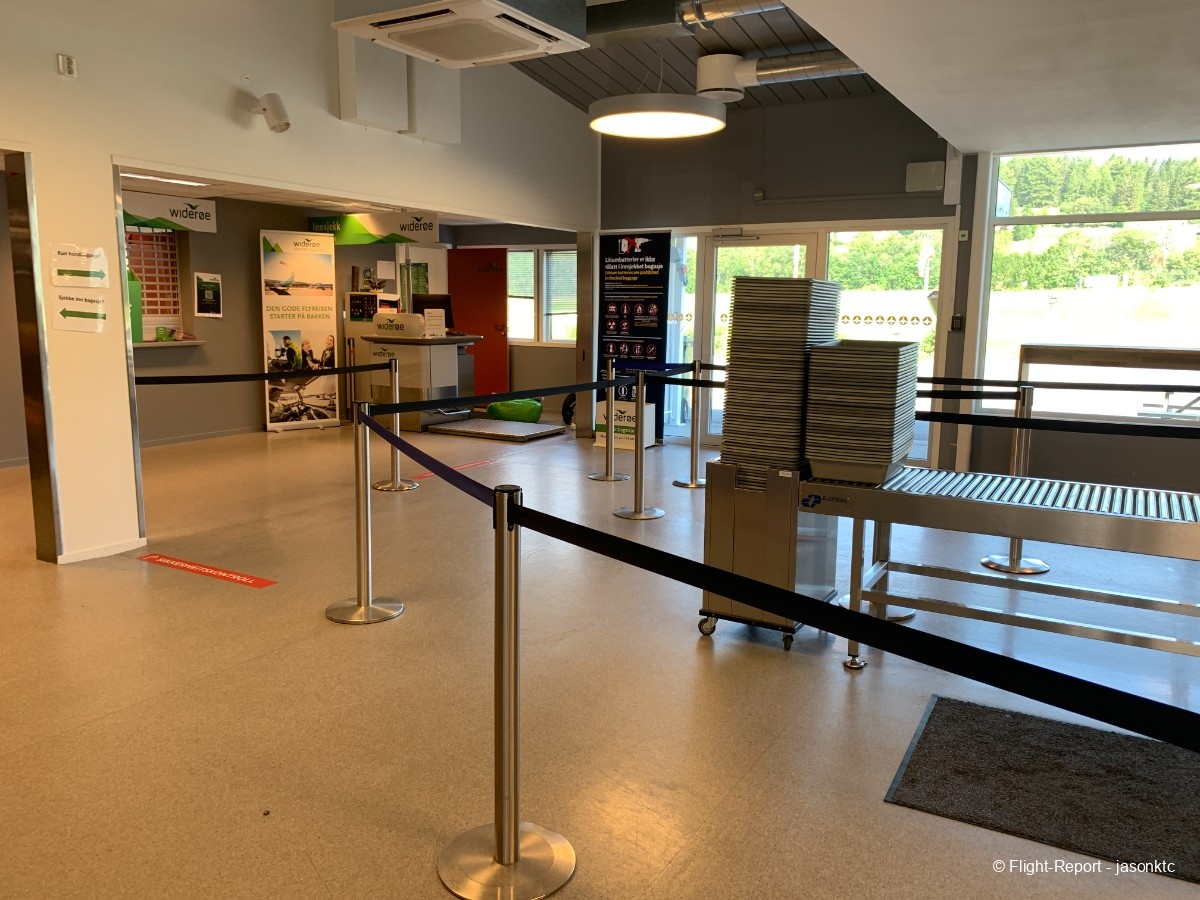
I received my physical boarding pass even though I had already checked-in online and received my digital boarding pass the night before. The paper quality of the boarding pass was much better than SAS, though it was still printed in black-and-white. Notice it said FREE on my seat? That is because on Widerøe's flights that are operated by DHC-8-100/200, there is a free seating policy which means passengers can only select their seats once they have boarded the plane. I also got a spare luggage tag as a souvenir.
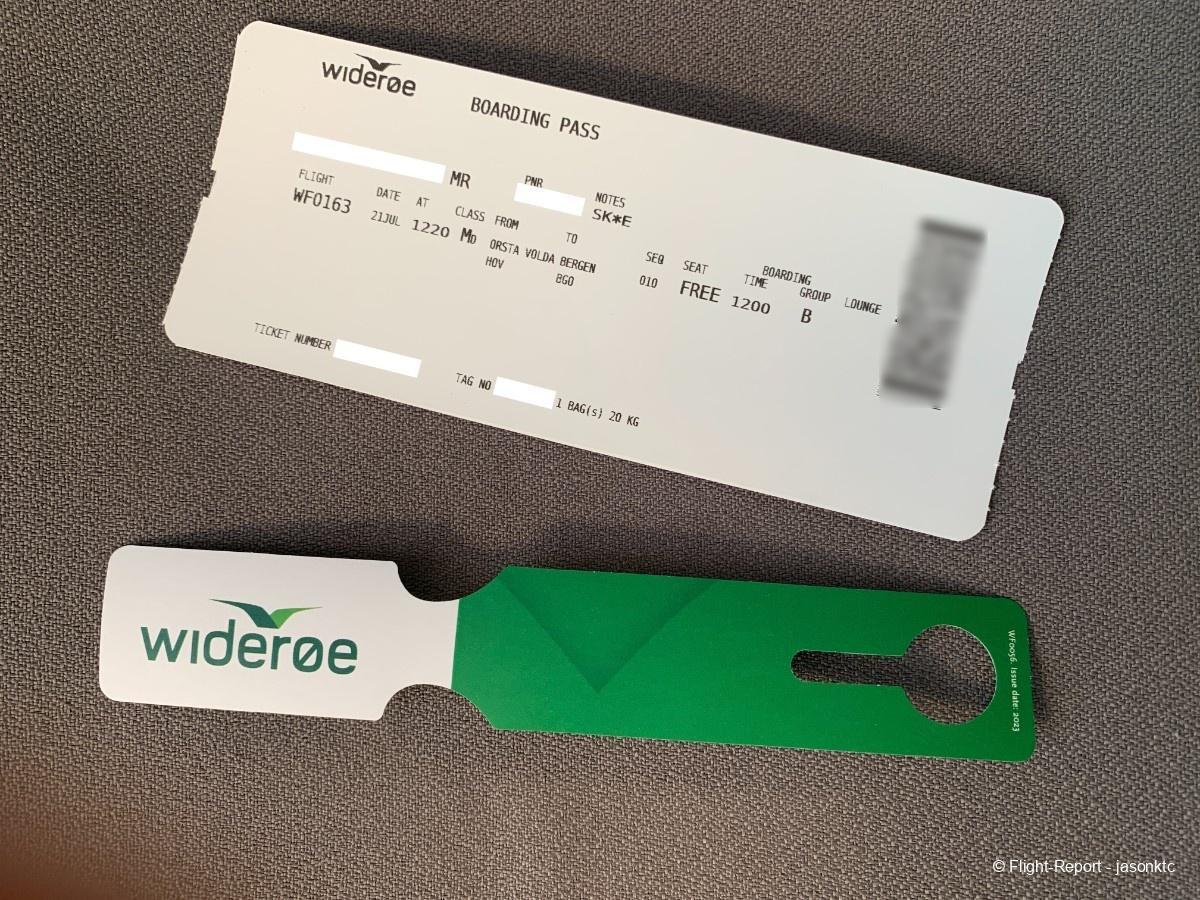
On the right hand side of the check-in counter is the terminal's office. Next to it is the security area, which only allows access one hour before the stated time of departure. So I sat on the few chairs that are scattered around the check-in area to wait for the security area to open. Lavatories are only available at the check-in area if I remember correctly.
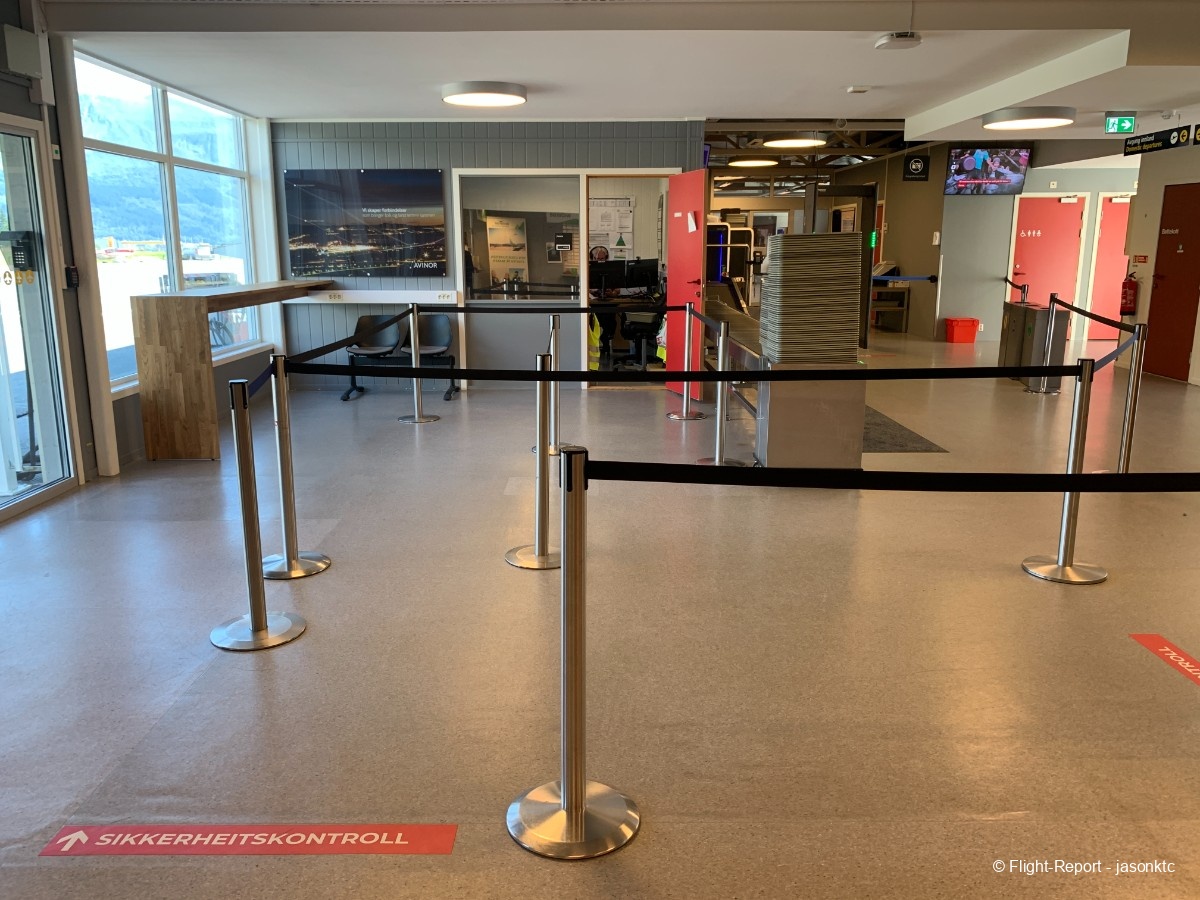
I took a sneak peak of the empty apron outside. HOV has a 1070-metre runway (06/24) and has no taxiways.
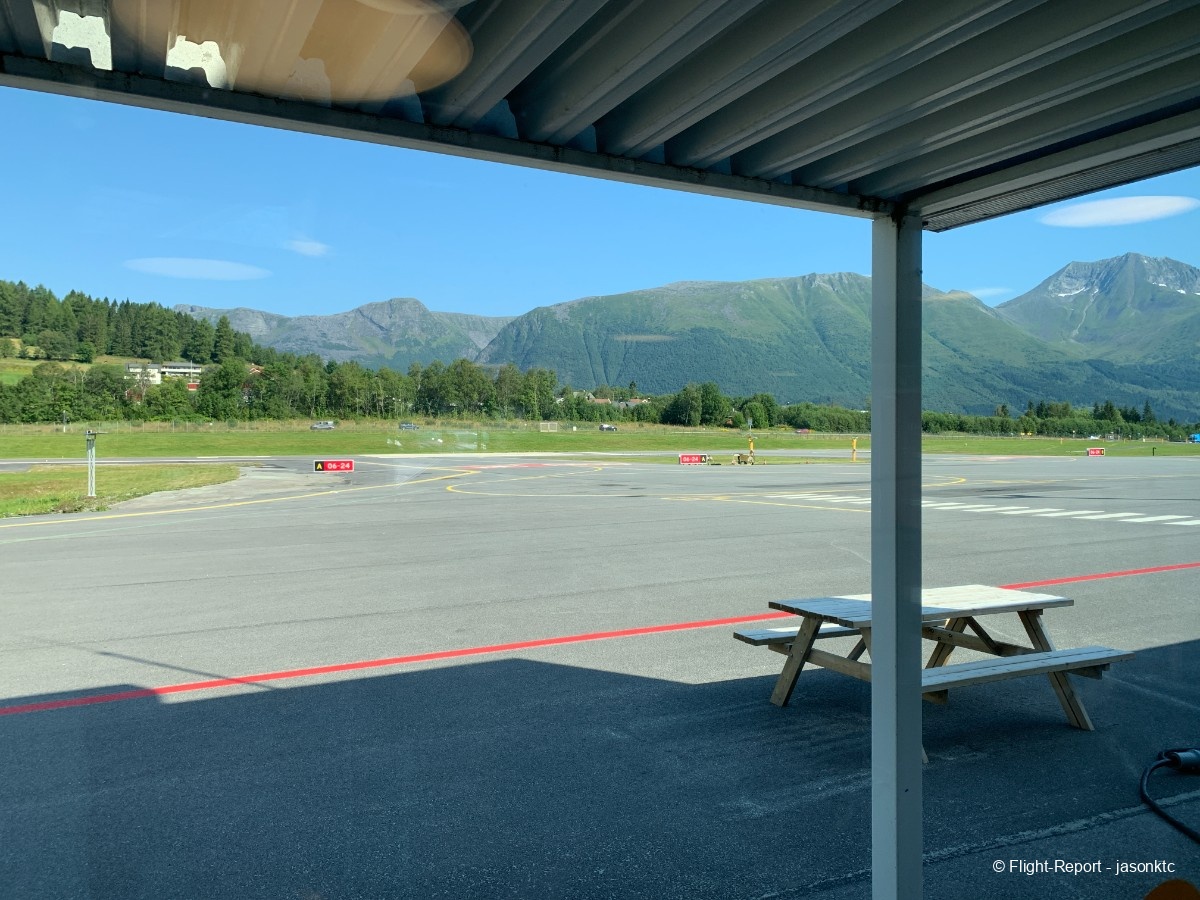
The below photo shows the departure and arrival of HOV. It is connected to Oslo, Bergen and Sogndal. Some flights, including mine, have stopover here and continue to Oslo or Bergen. All flight are PSO services that are served by Widerøe and its DHC-8-100 turboprops.
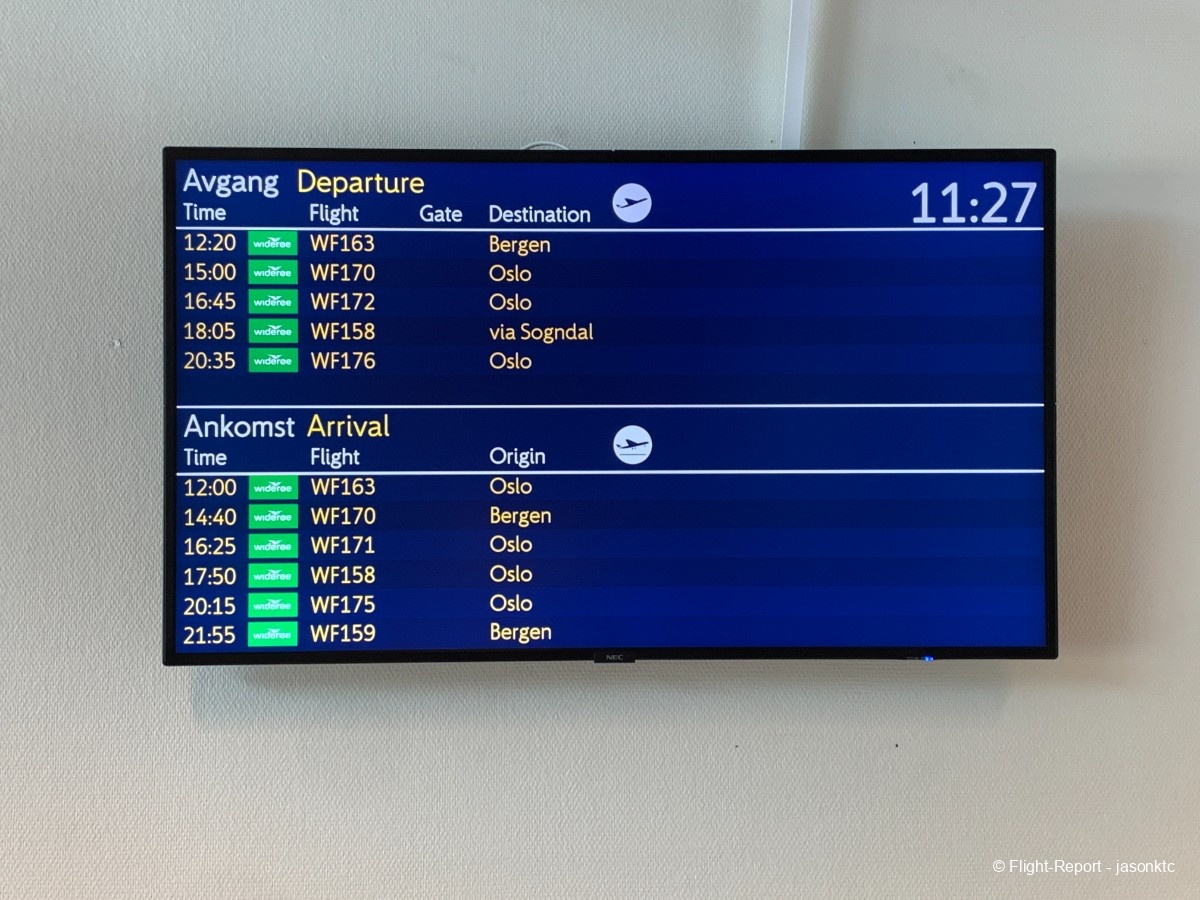
Security at HOV:
The security area is basic with one conveyor belt and x-ray machine, one metal body detector and two staffs. I was told to put all my carry-on and checked baggages onto the conveyor belt. After x-ray, the checked baggages were manually separated by staff and were delivered to the baggage room behind. The best thing of departing from a small airport is that there is no rush in removing and repacking personal items and electronics in your carry-on baggages as there are only few passengers. The whole security screening process in HOV was absolutely relax and hassle-free, something that I will certainly miss when travelling through mega airports.
Gate at HOV:
There is only one gate at HOV and it is located right behind the security area. There is about 50 seats plus two vending machines. Unfortunately, there is no water fountain to fill up water bottles.
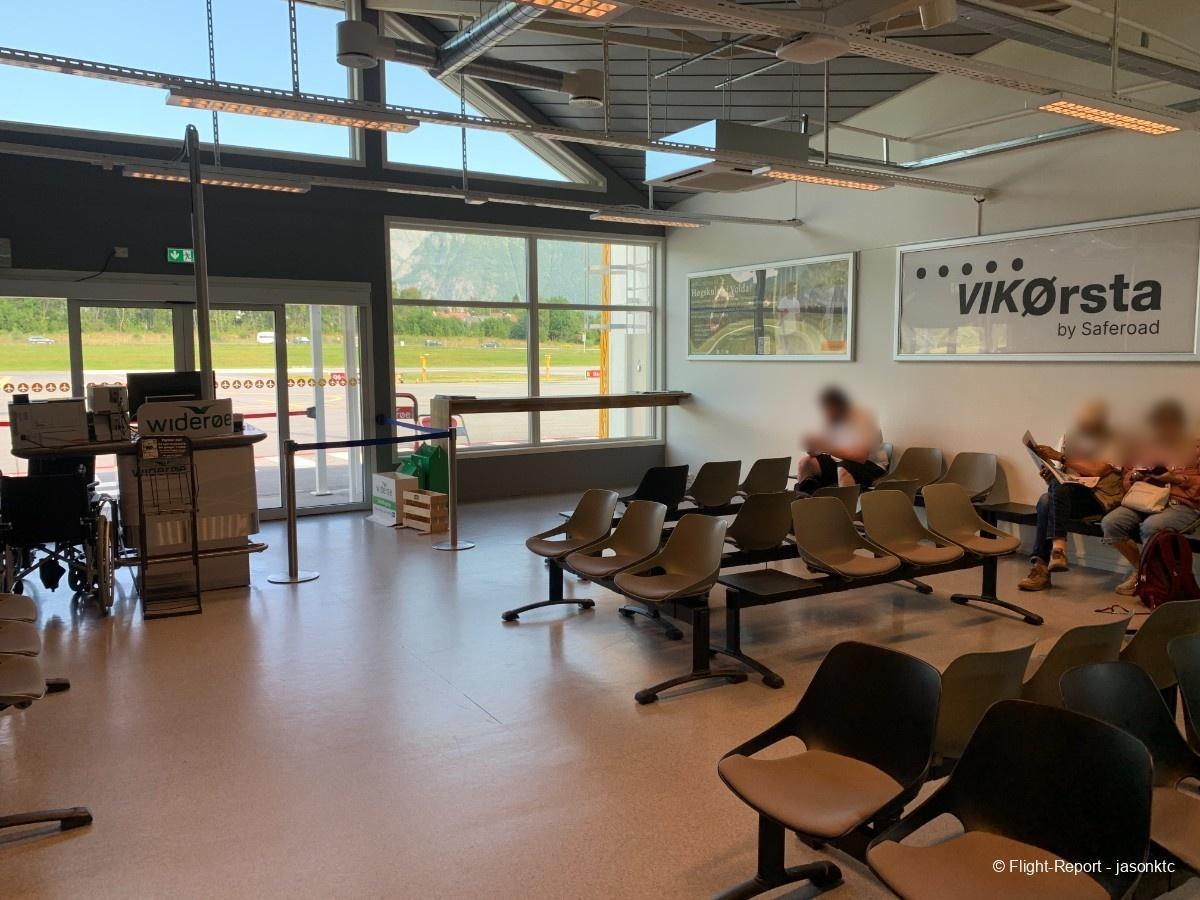
Aircraft and Flight Information:
The plane that operated today's WF163 flight was LN-WIF, a 31.6 years old DHC-8-103 that has joined the airline since 21 January 1994. It still carries the old Widerøe livery which has various shades of green on its fuselage, pale green engines and tail. I actually found the old livery to be more appealing than the new one as the new one has sort of move towards a euro-white approach on the fuselage like many airlines do nowadays. WF163 is actually operates as Oslo Gardermoen (OSL) to HOV, then terminates at BGO.
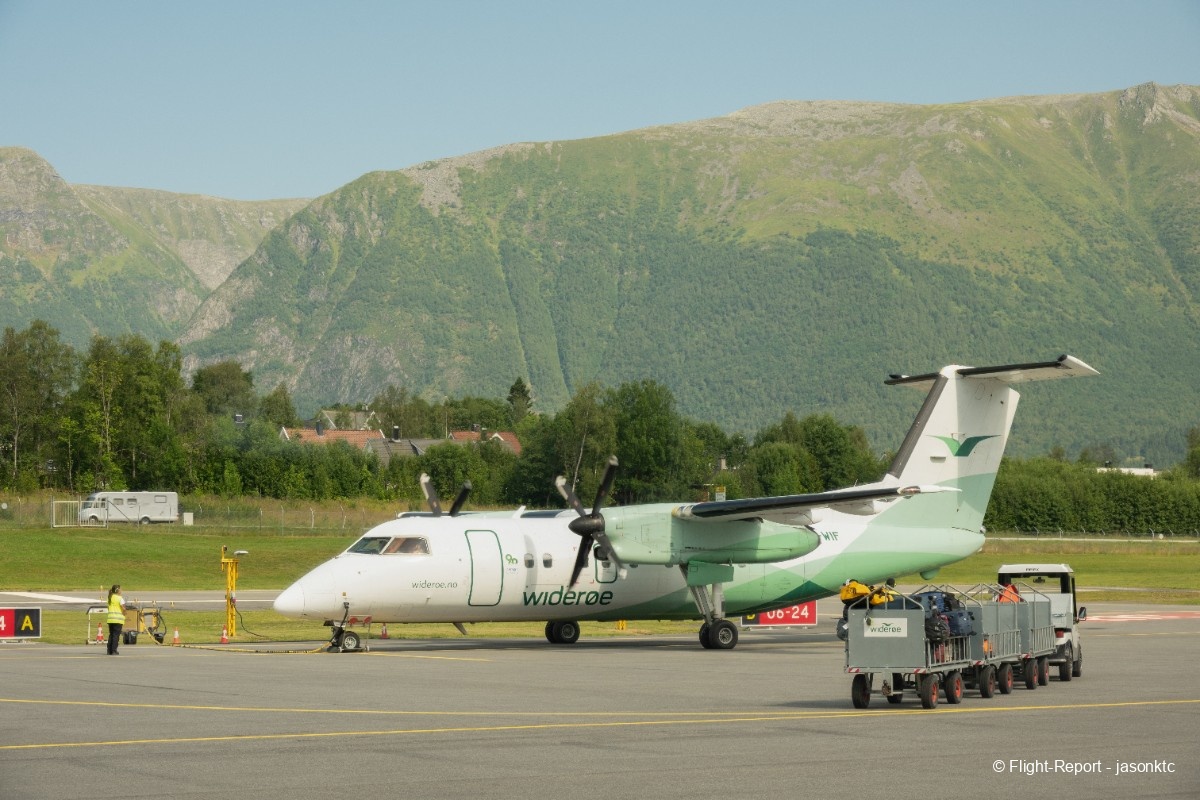
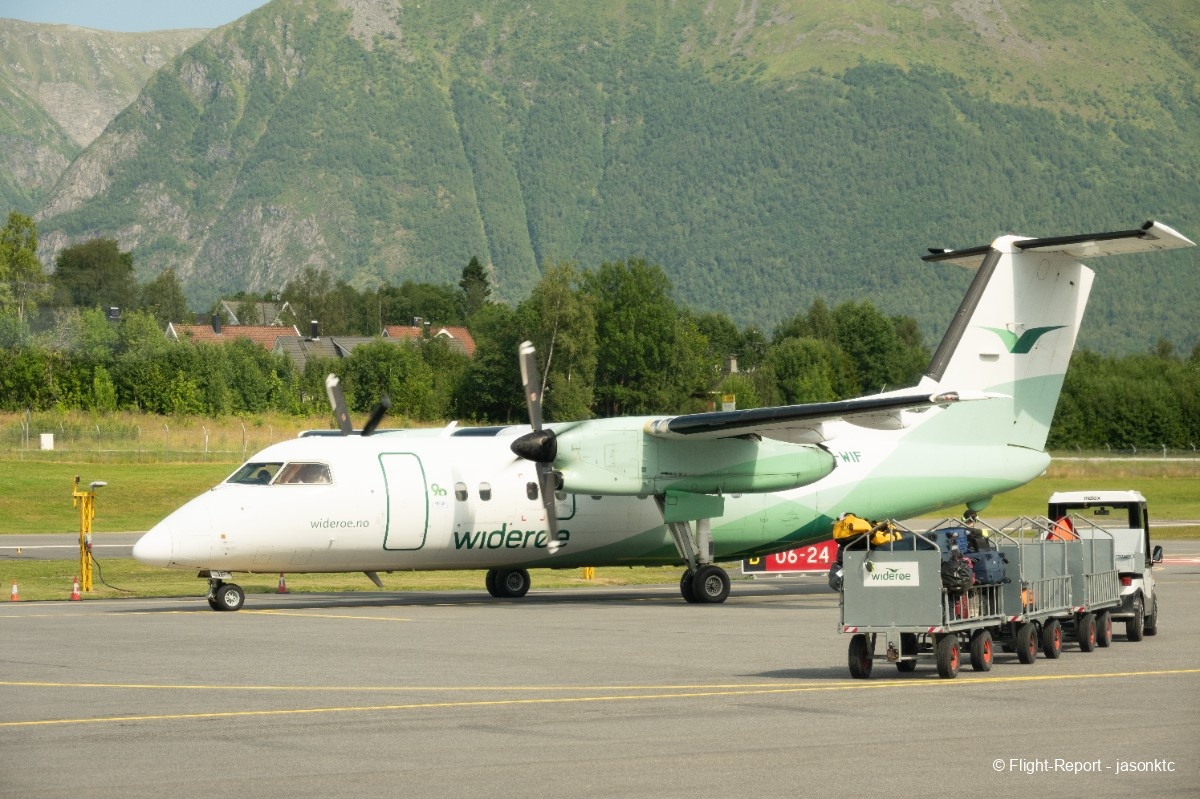
Date: 21 July, 2025
Flight: Widerøe WF163
Route: Ørsta–Volda (HOV) - Bergen (BGO)
Aircraft Type: De Havilland Canada Dash 8-103
Aircraft Registration: LN-WIF (Y39)
Seat: 5A (Free Seating when board)
Scheduled Time of Boarding: 12:00 CEST
Actual Time of Boarding: 12:11
Scheduled Time of Departure: 12:20
Push Back: 12:27
Takeoff: 12:28
Scheduled Time of Arrival: 13:15
Landing: 13:07
At Gate: 13:18
Passenger Load: 77-80%
Boarding of WF163:
Before our boarding, passengers from OSL disembarked first and their baggages were offloaded, too. Boarding was slightly delayed and started at 12:11. People with disability and parents with children were welcomed to board first. We simply stepped on the tarmac and walked towards the remote stand after exiting the gate. There is only one door on the port side of the DHC-8-100 and we boarded the plane with the door's built-in stairs. The rear door is for accessing the cargo hold.
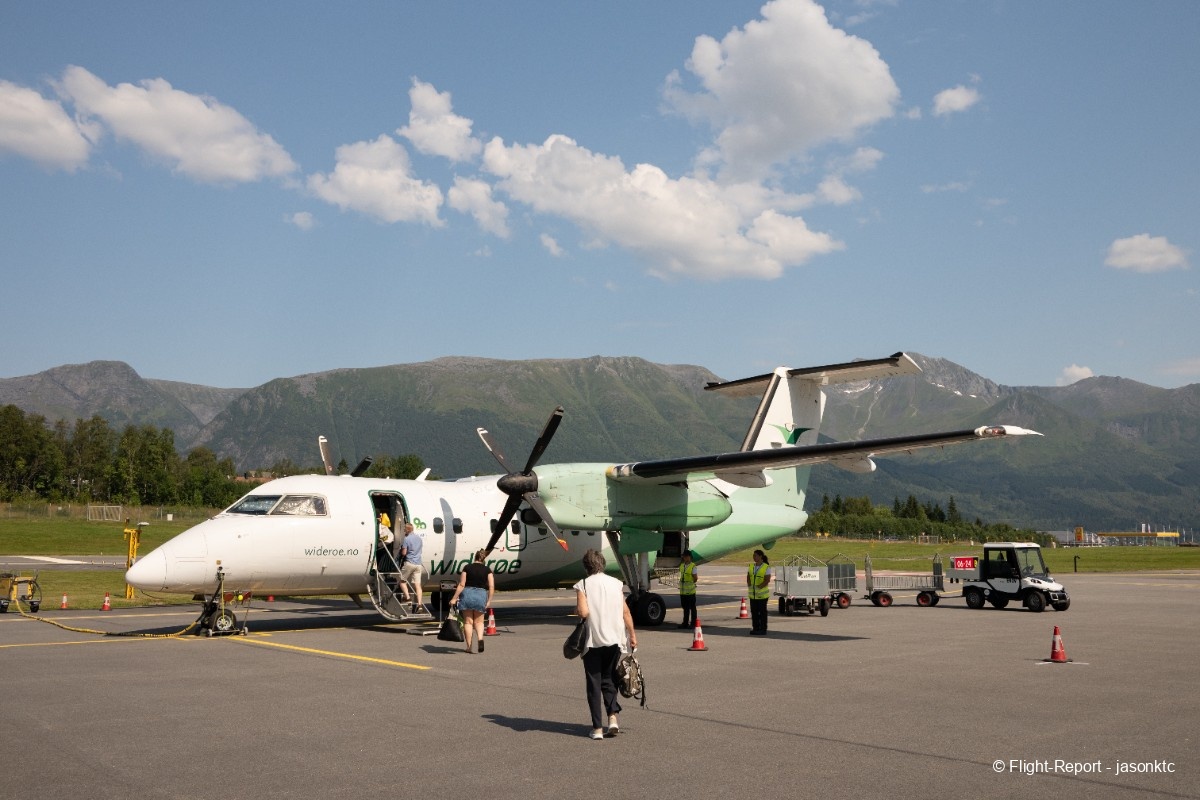
I managed to take a quick snap of HOV's apron, tower and garage while walking towards the plane.
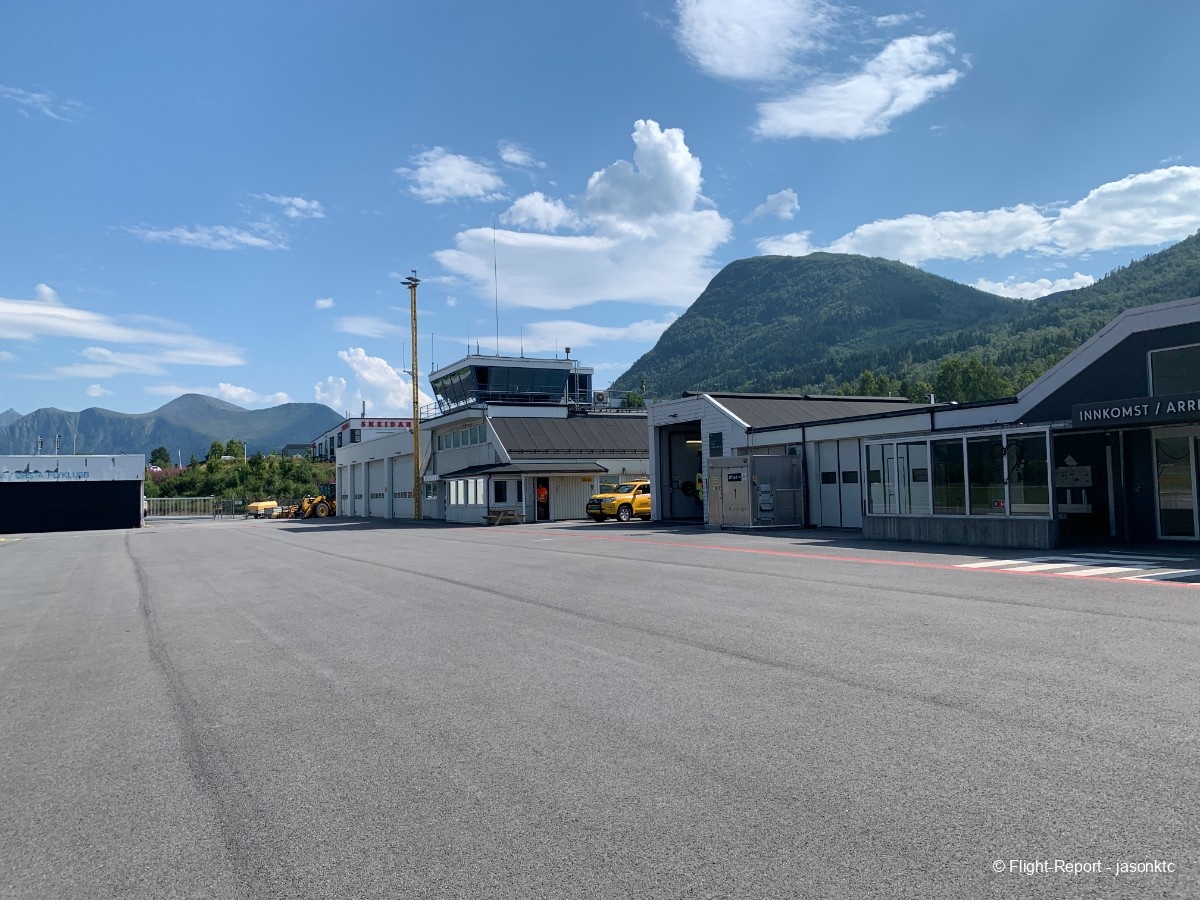
Cabin and Seats of LN-WIF:
Widerøe's DHC-8-100s have 39 seats spread across 10 rows in a 2-2 configuration in one class. Notice that the first row on the right (1C and 1D) is facing backward, and that there is a middle seat facing directly to the aisle in row 10. I would personally avoid them when selecting seats during boarding. The jump seat for the flight attendant is located next to the plane door, opposite to seat 2A and 2B.
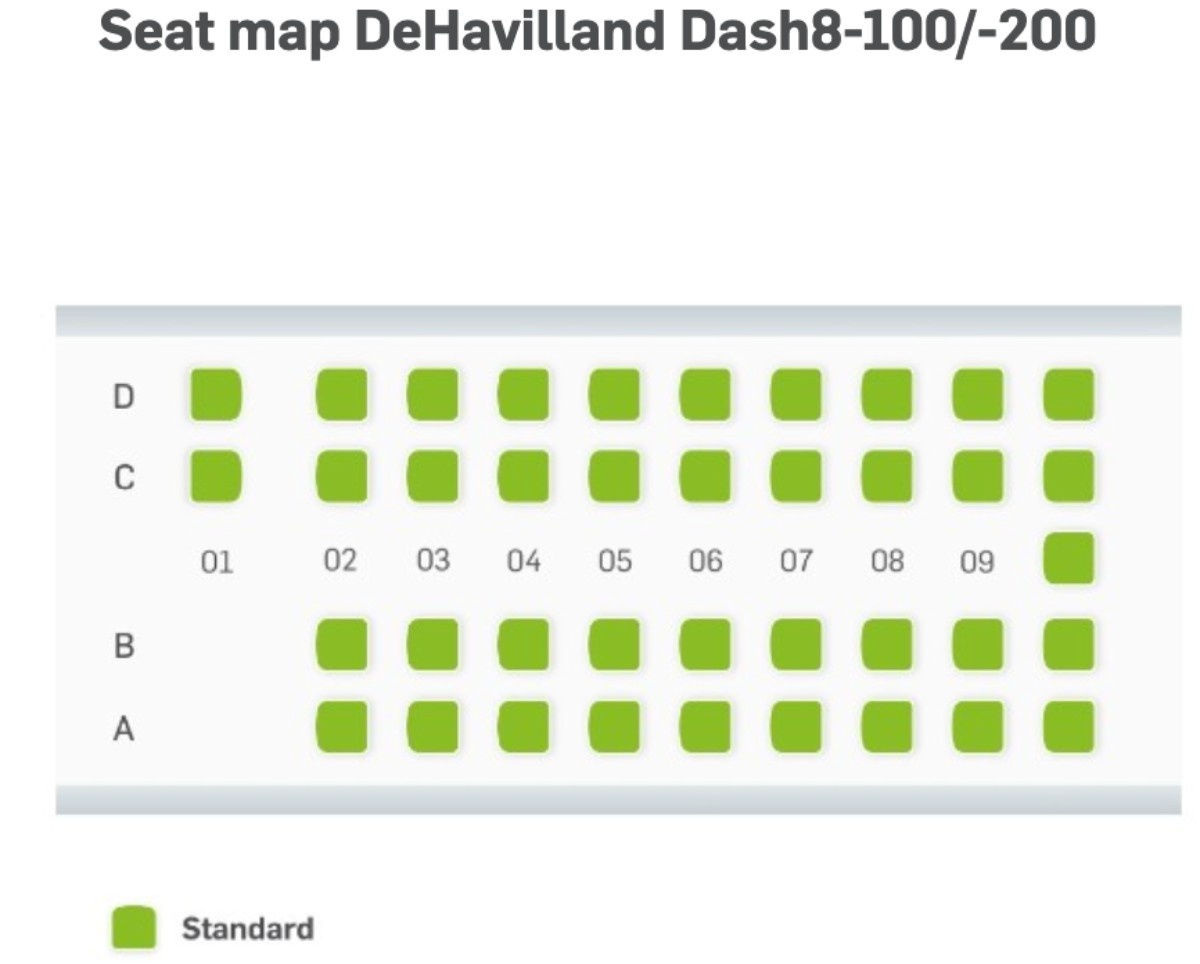
The plane is configured with dark grey seat upholstery, dark blue carpet and white panel, plus bulkhead in a light beige colour. Big backpack or small suitcase may find it difficult to fit inside the small overhead bin. I found them to be comparatively smaller than those on ATR turboprops.
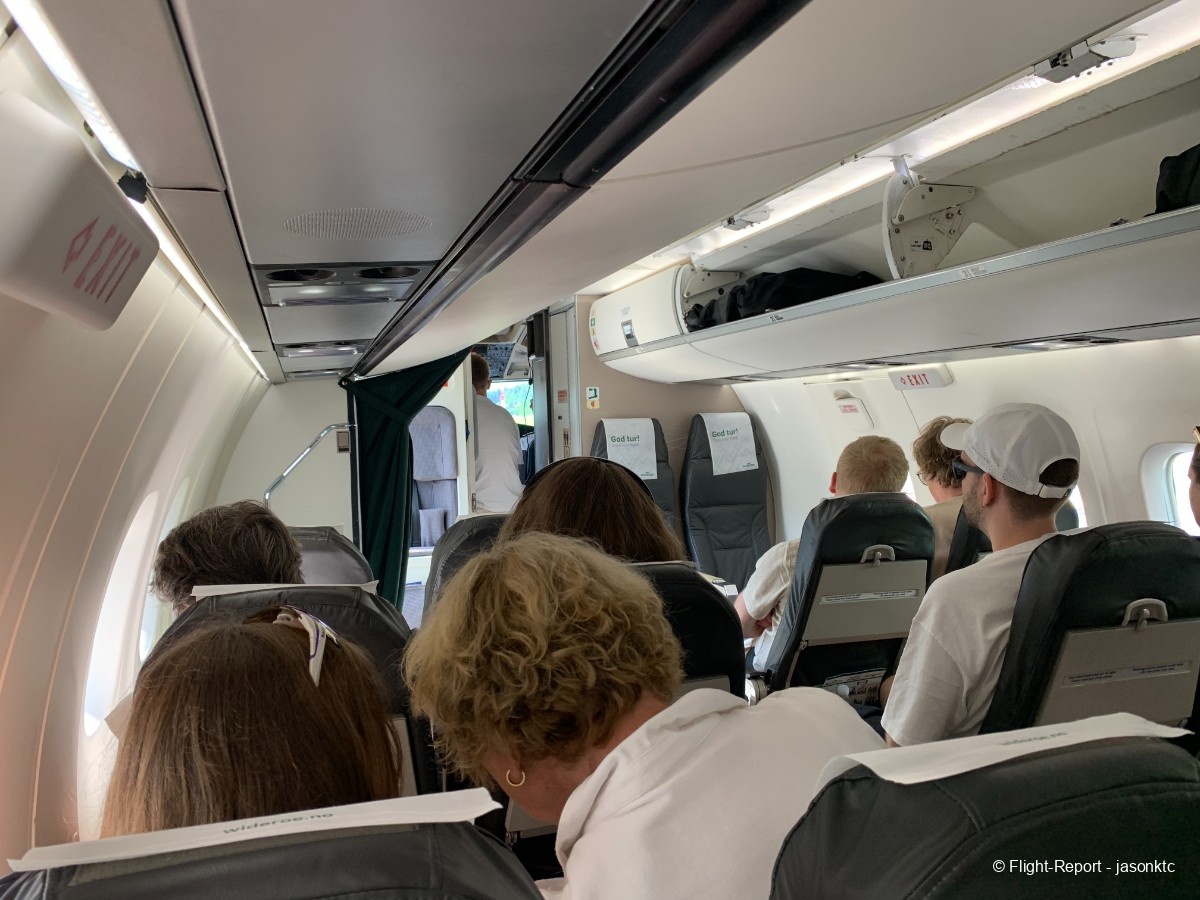
As the flight offered free seating, I had selected seat 5A which the flight attendant reminded me that it is an emergency exit seat. The seat upholstery is made of material similar to synthetic leather. There is no physical headrest but only a white headrest cover with green- coloured greeting words in Norwegian and Widerøe's logo on each seat. All the seats are slimline design (maybe slightly thicker than the A320s on SAS).
The seatback is basic with a full-sized tray table and large seat pocket underneath. There is no usb charging ports or sockets installed. My seat padding was slightly worn but the generous legroom made up for it. The plane is definitely showing its age with some wear and tear and gaps on panel but the cabin is kept clean during the whole flight. Overall, the seat is totally fine for a short 55-minute flight.
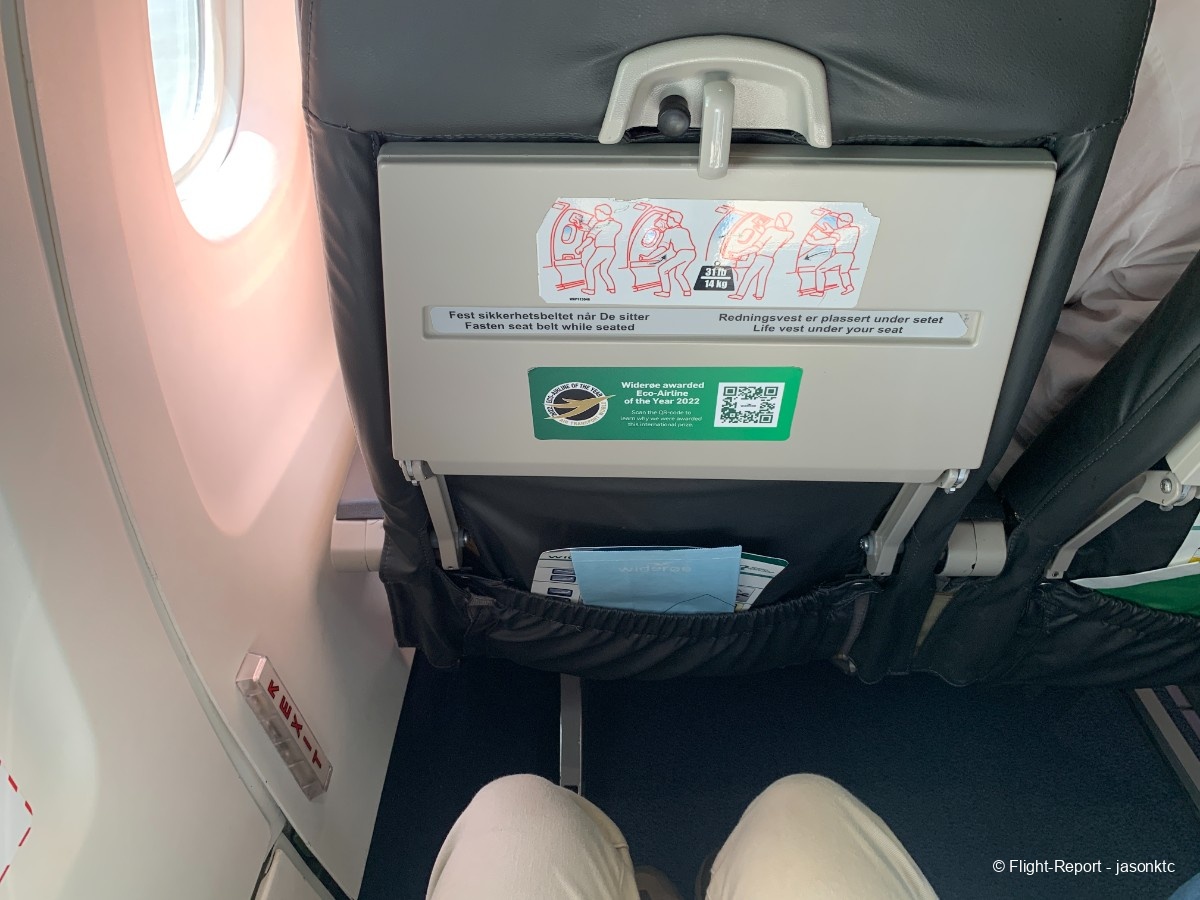
I could easily observe the operation of the propeller and the engine nacelles that also hold the landing gear from seat 5A. It is very rare for passengers to be able to see the extraction and extension of the landing gear when travelling on planes.
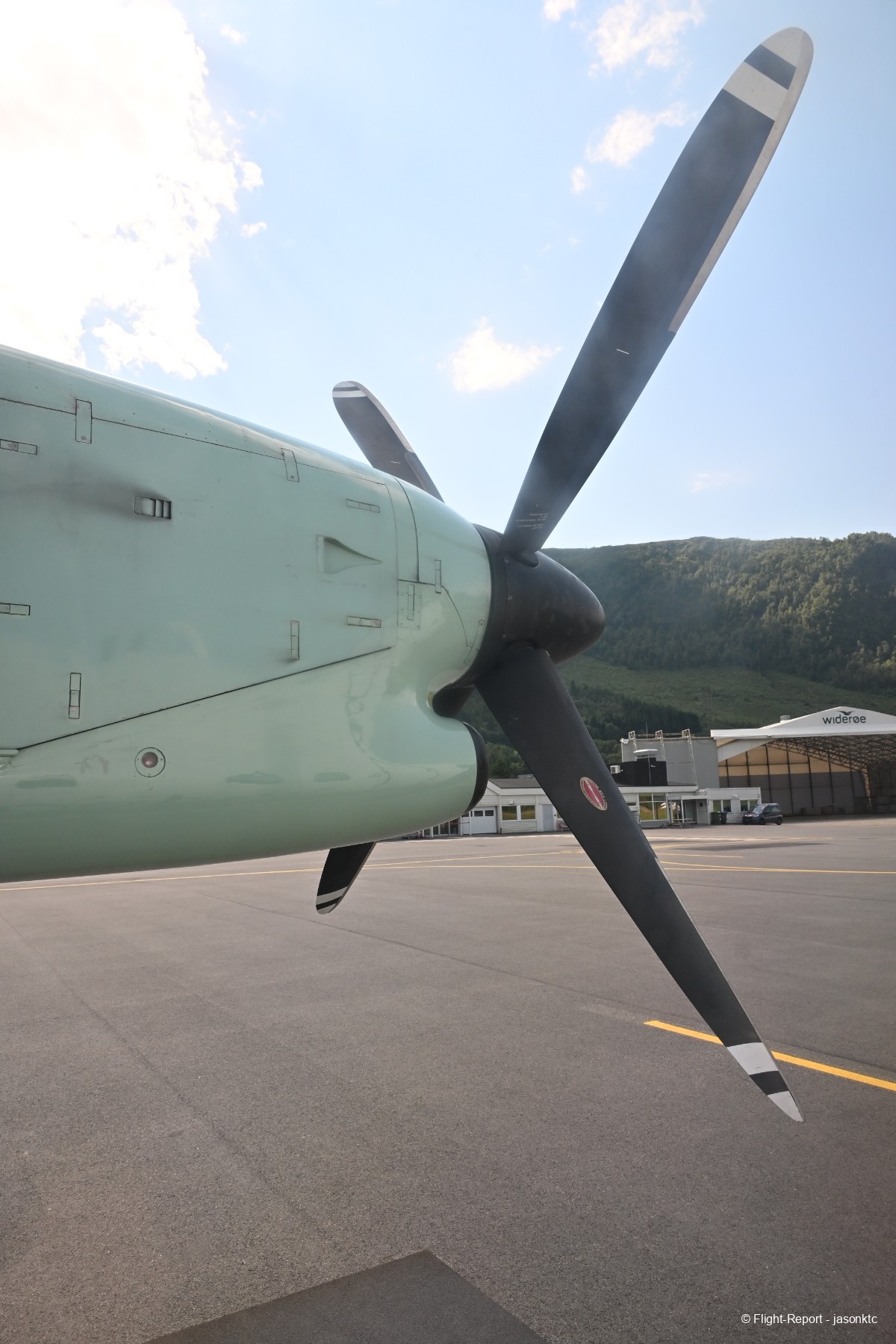
The overhead panel is painted in black and of classic design. I am glad that there are individual air nozzles.
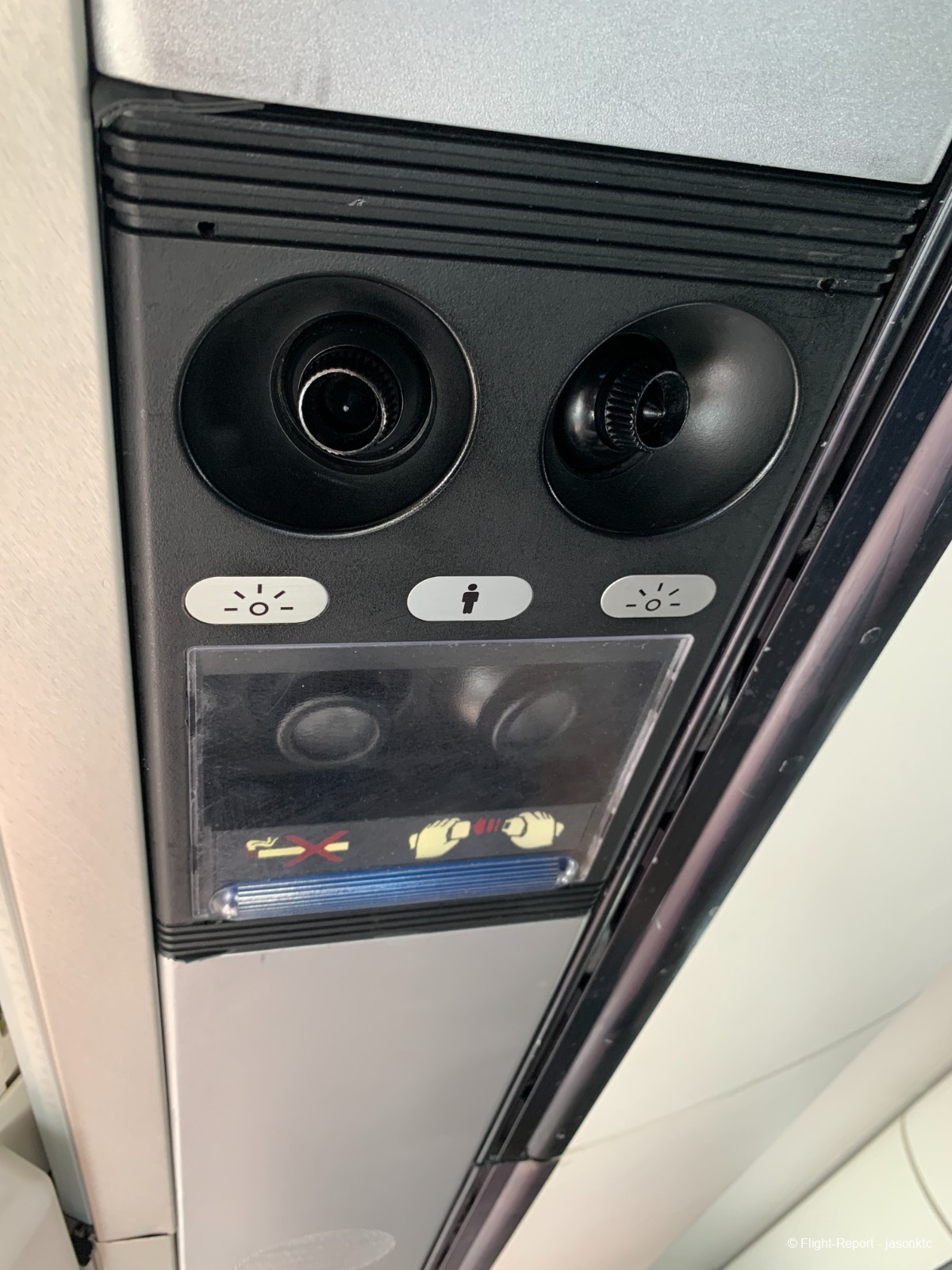
Departure from HOV:
Pushback began at 12:27 and due to the close proximity between the remote stand and the runway, the plane was soon on runway 24. The pair of powerful PW100 turboprop engines spooled up and we had a fairly short take off towards southwest at 12:28.
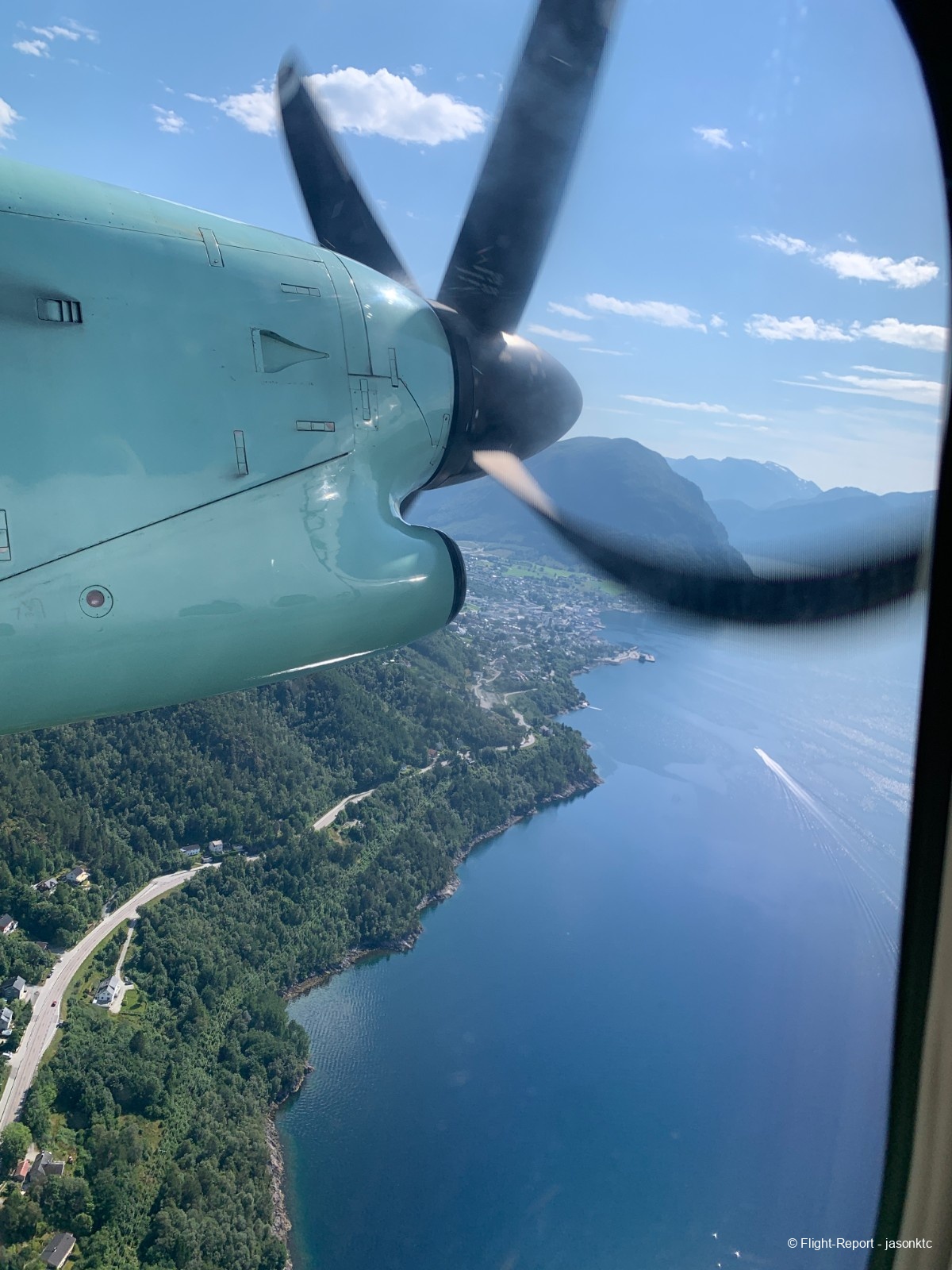
We quickly turned left and flew towards south. The town of Volda is visible in the below photo.
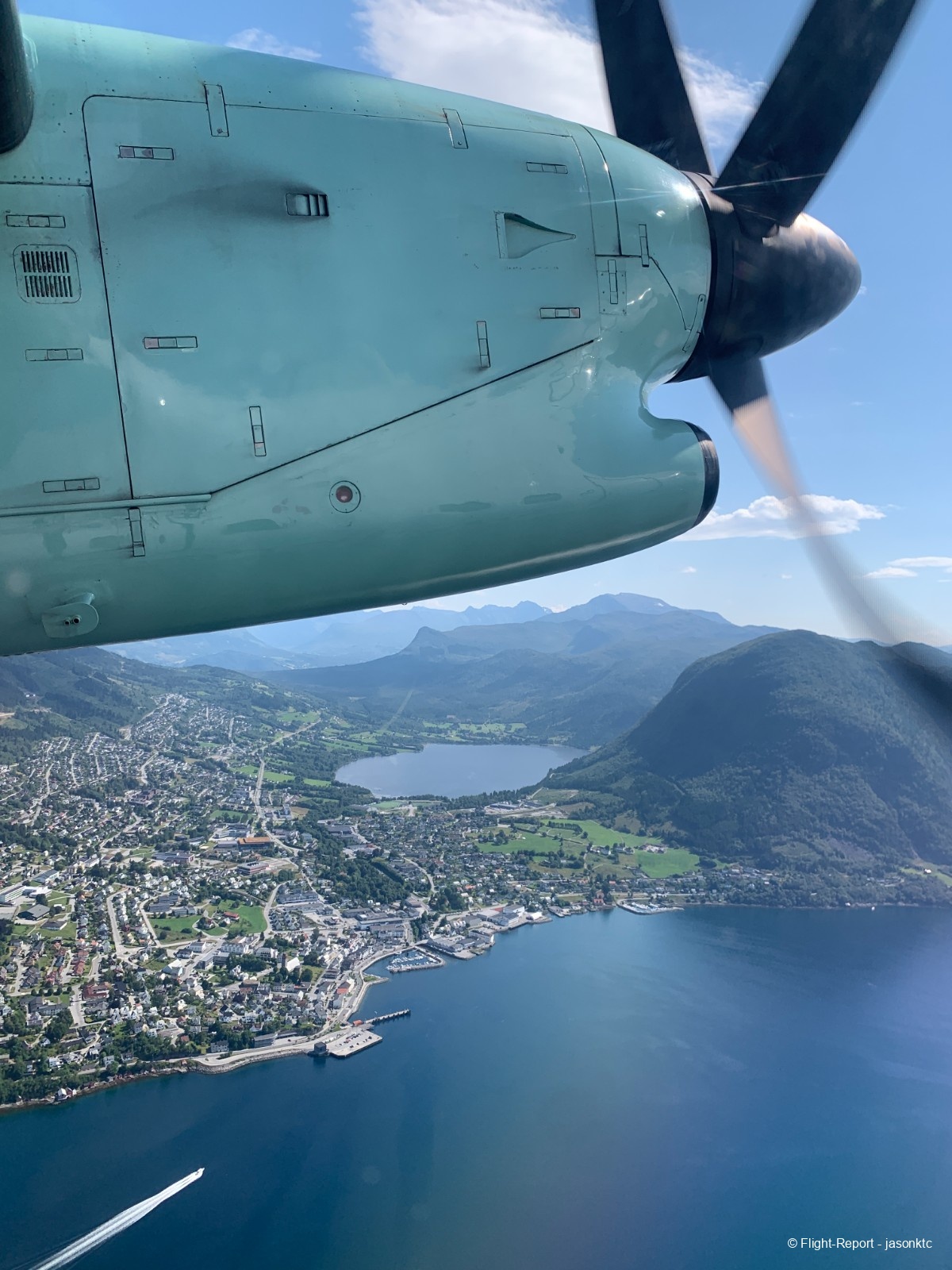
We continued our climb and began too see numerous fjords, mountains and lakes. The below photo shows the Hornindalsvatn Lake on the left and Innvikfjorden fjord on the right.
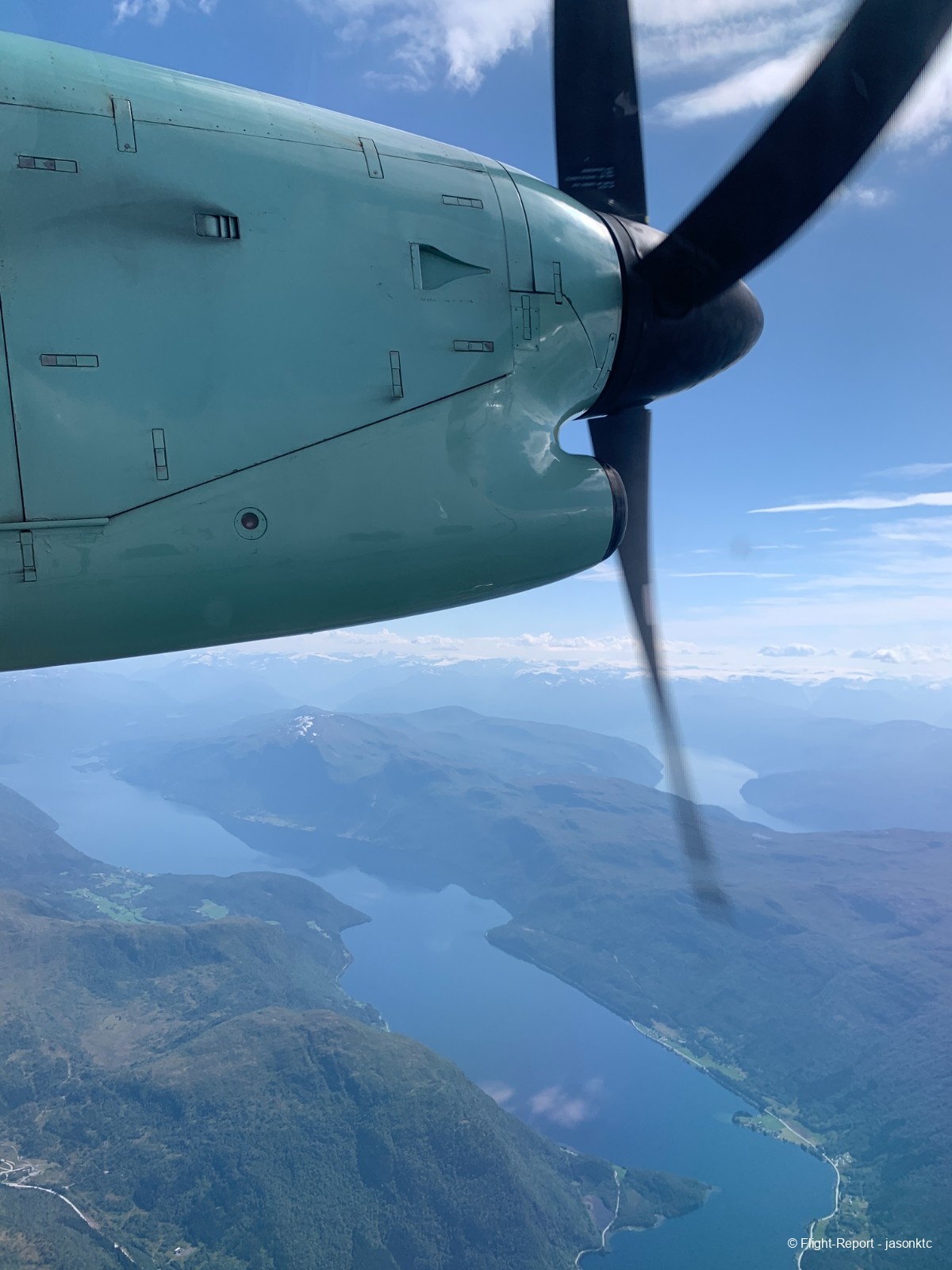
My eyes were glued to the spectacular views outside during most of the flight. Below is the Naustdal-Gjengedal Protected Landscape.
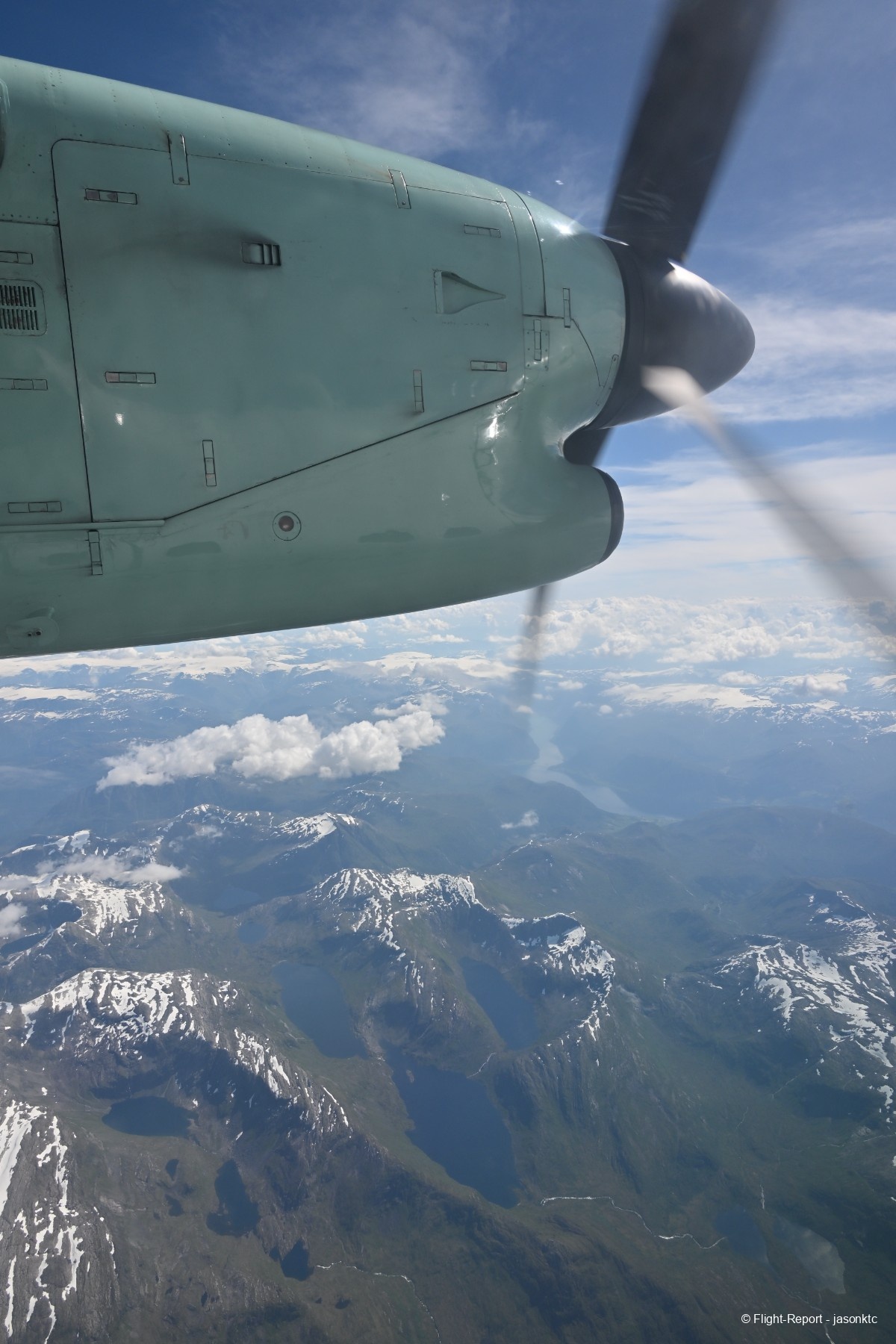
Further away and partially blocked by the scattered clouds, the white bits on top of the mountains are the famous Jostedalsbreen Glacier, which is the largest glacier in continental Europe. In a sunny day, Briksdalsbreen may be visible with naked eyes. It is one of best known arms and viewpoints of the glacier. The plane also reached the cruising altitude at this point.
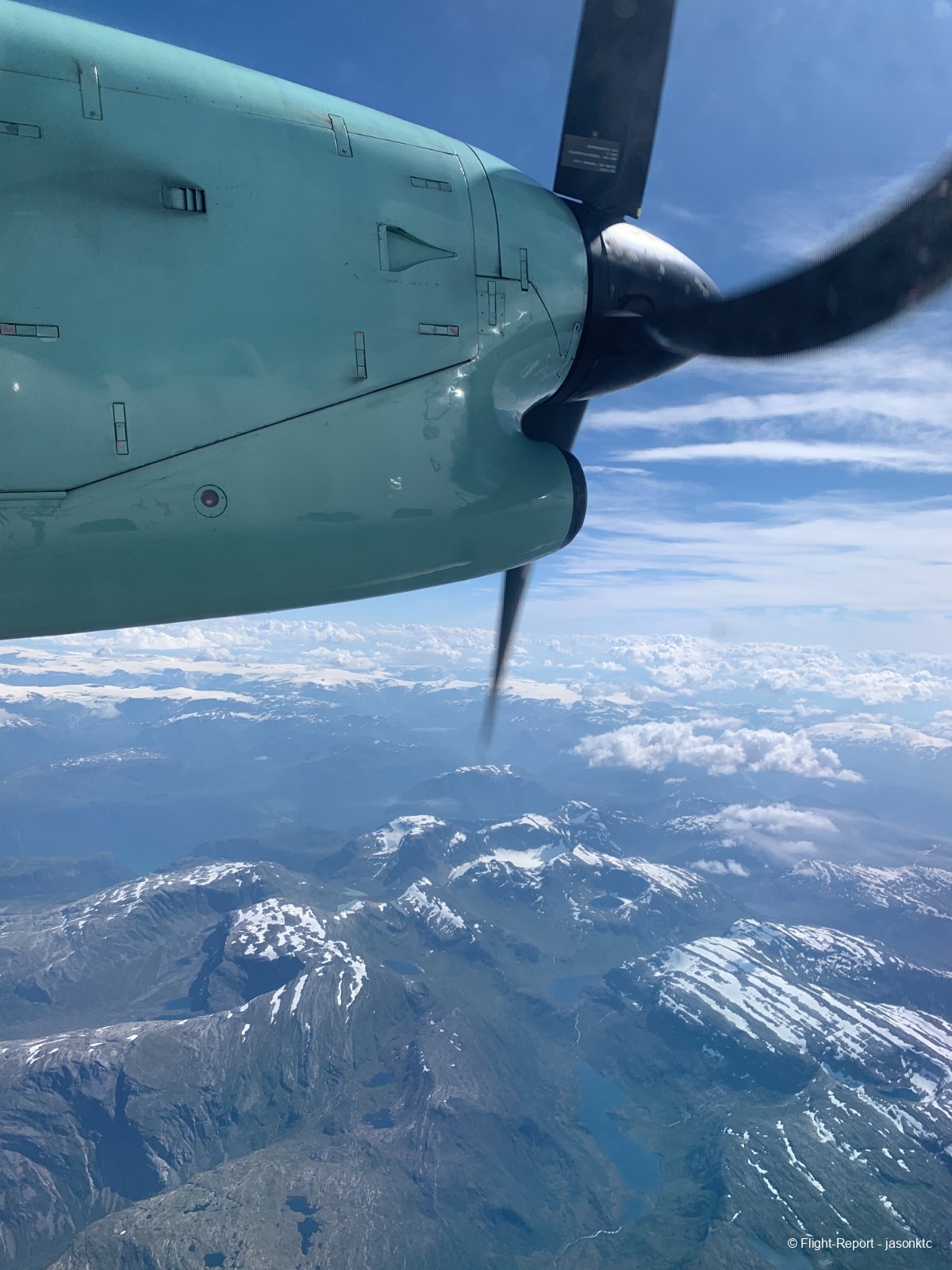
Literature Materials:
I had a look at what was inside the literature pocket. There was a safety card and two air sickness bags.
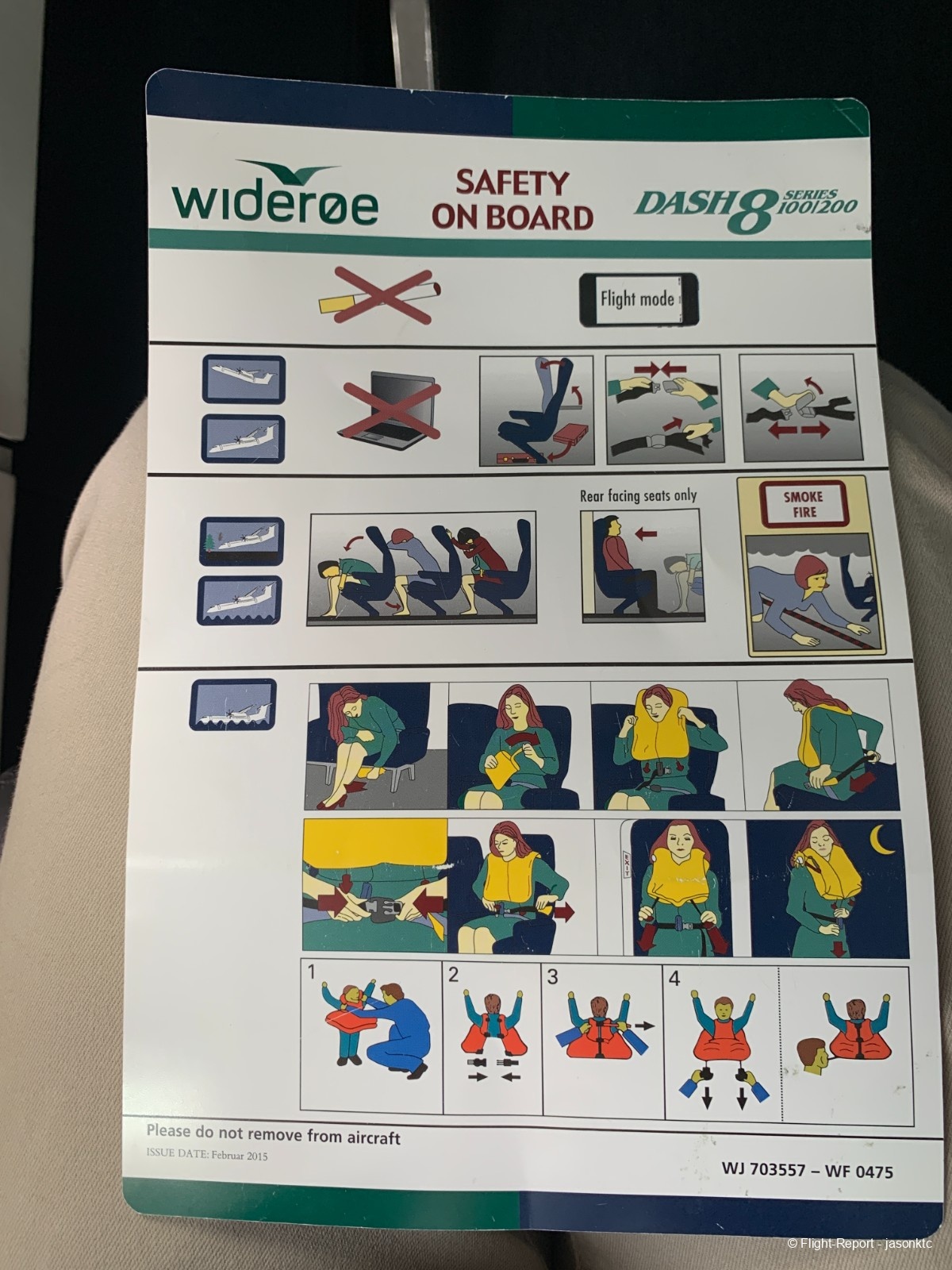
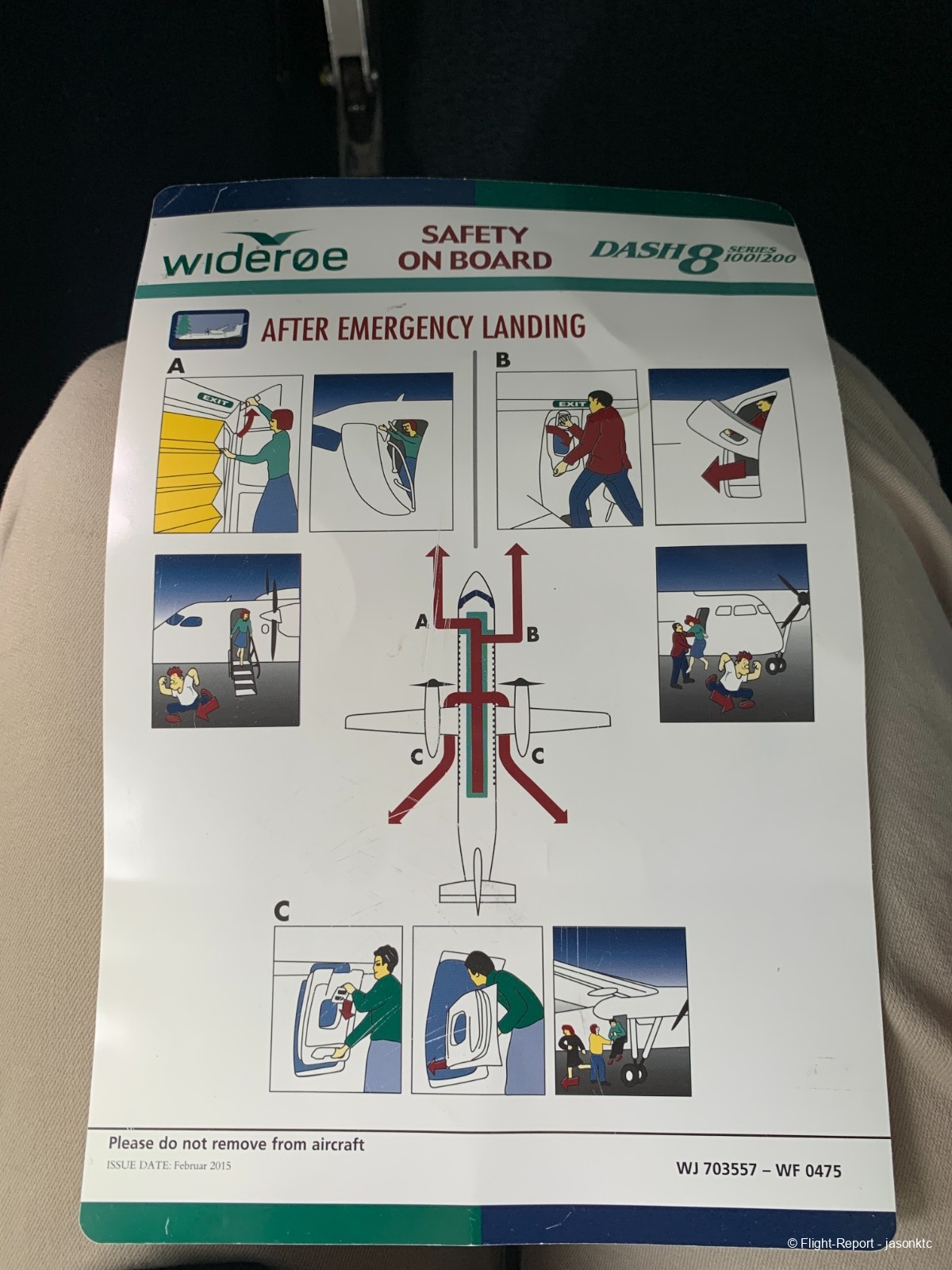
Cabin Crew and Service on WF163:
There was one cabin crew serving the entire plane. I found her to be very kind, friendly and polite. She performed all the safety demonstration and PA announcement by herself in Norwegian first then English. She even comforted a young teenage girl who sat in front of me during mid-flight. I heard that it was the girl's first time flying on a plane and she felt nervous during take off.
There was no inflight menu either as Widerøe do not provide inflight sales on their smaller DHC-8-100/-200/-300 planes. However, snacks and/or meals plus beverages are available for purchase on domestic or short international routes operated by their larger planes. On longer international routes (i.e. Brussels, Florence, Nice, Munich), pre-ordered meals and duty-free products are available.
Widerøe do not provide wifi or internet service on their turboprop planes. However, their Embraer E190-E2 jet planes do provide wifi which allows passengers to use the entertainment streaming service with their phones or tablets.
Nevertheless, chocolates and sweets with Widerøe logo were given to passengers before descending. I believe the sweets had various flavours. Mine was mint but I saw other passengers got liquorice.
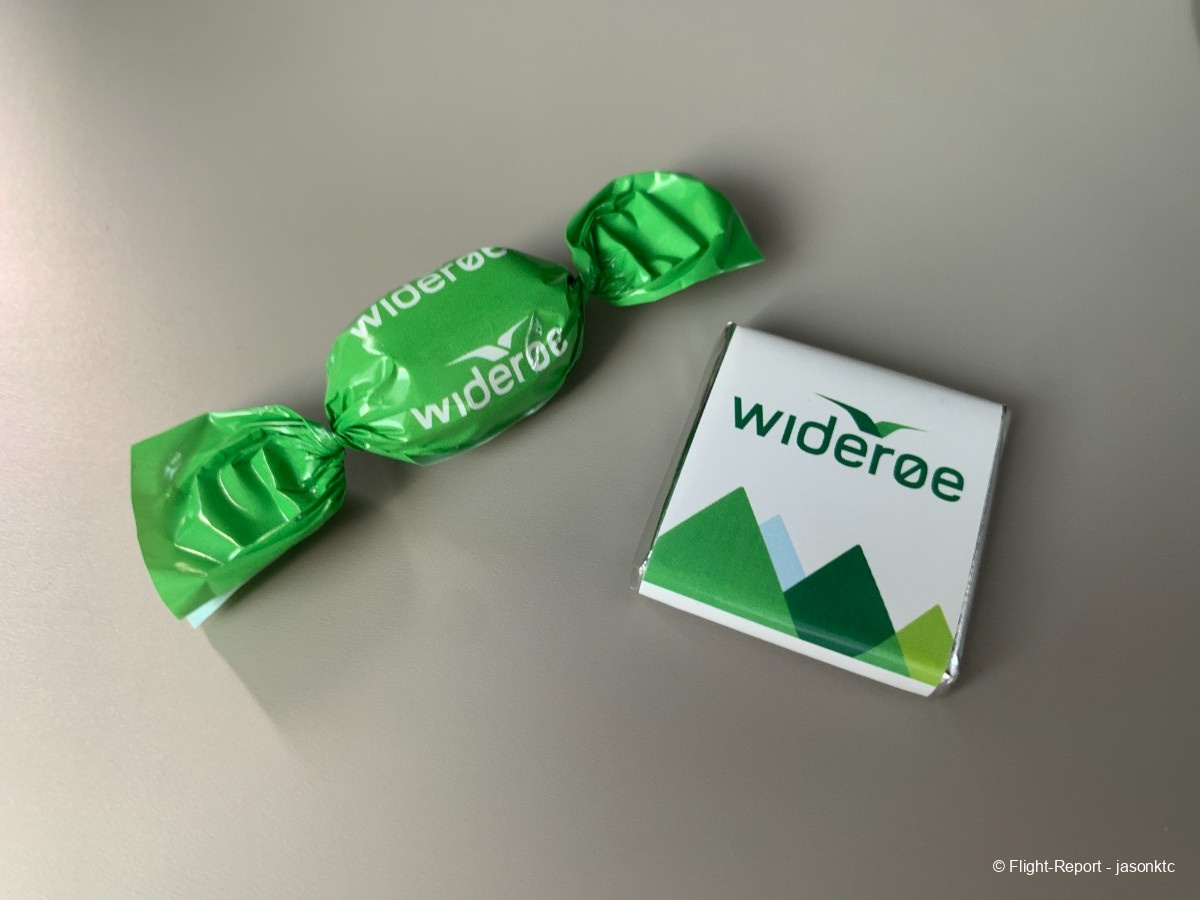
I personally think the lack of wifi or entertainment is not a problem on Norway's domestic flights because there is nothing more entertaining than looking at the breathtaking landscape out of the plane. We were close to the middle of Sognefjord (waterbody on the left) in the photo below. It is the deepest and longest fjord in Norway, stretching 204km inland.
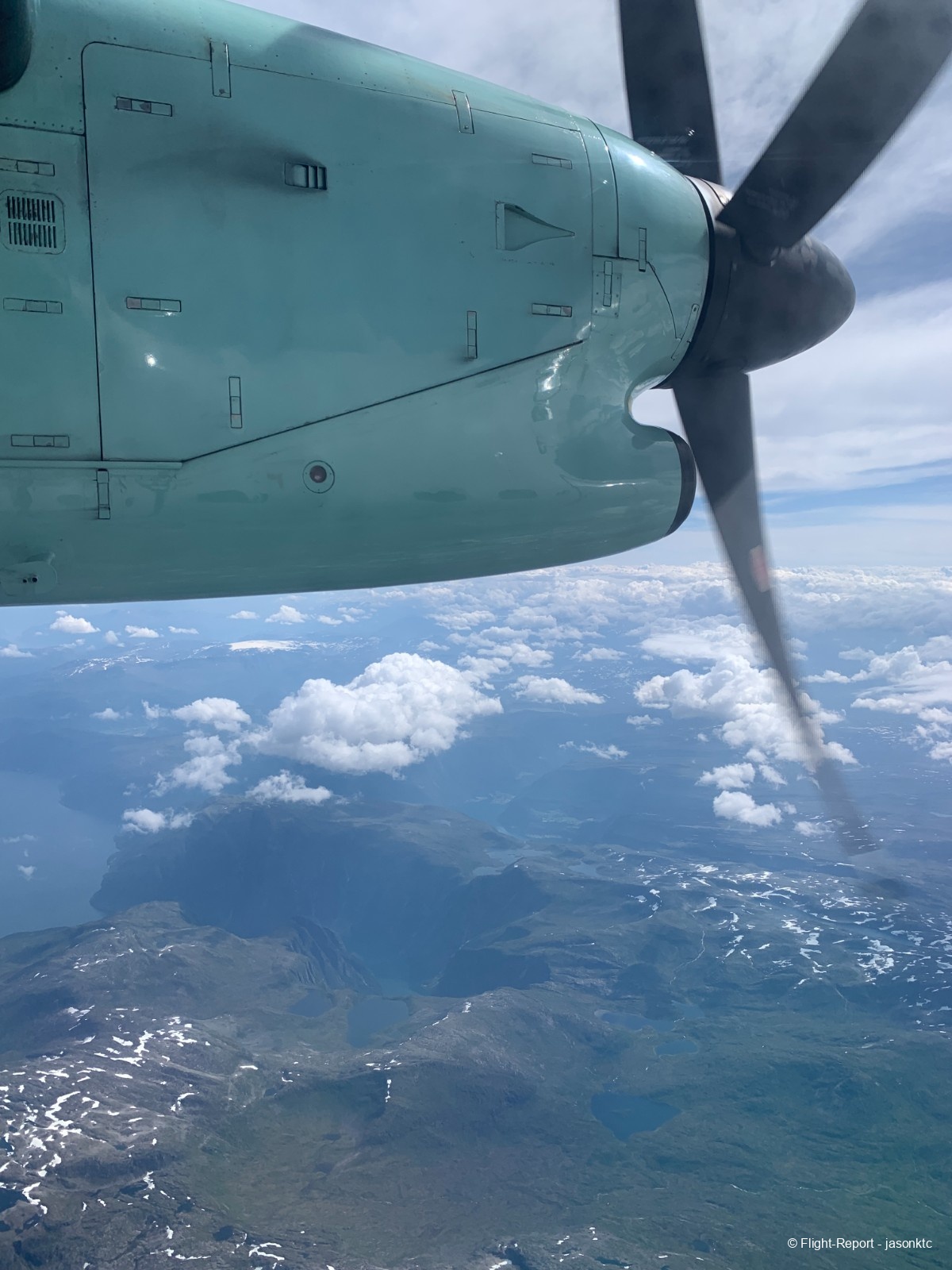
Descend towards BGO:
After passing Sognefjord, the plane turned southwest and shortly started the descend towards BGO. Then we turned south again after passing Askevatnet. The villages at the outskirt of Bergen started appearing.
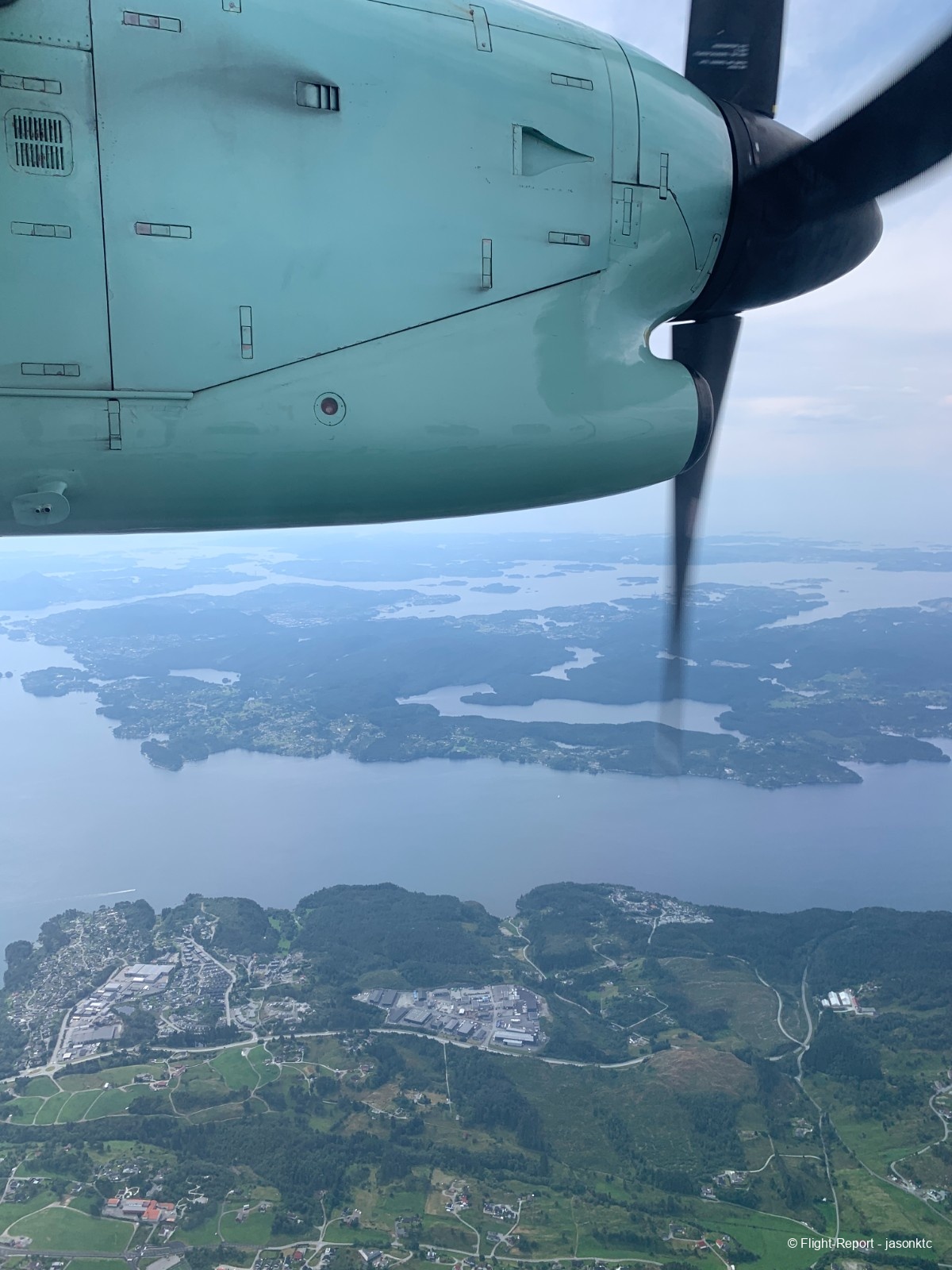
As we lined up to BGO's runway 17/35 from the north, we flew pass Askoy bridge which is located in the west of Bergen city centre.
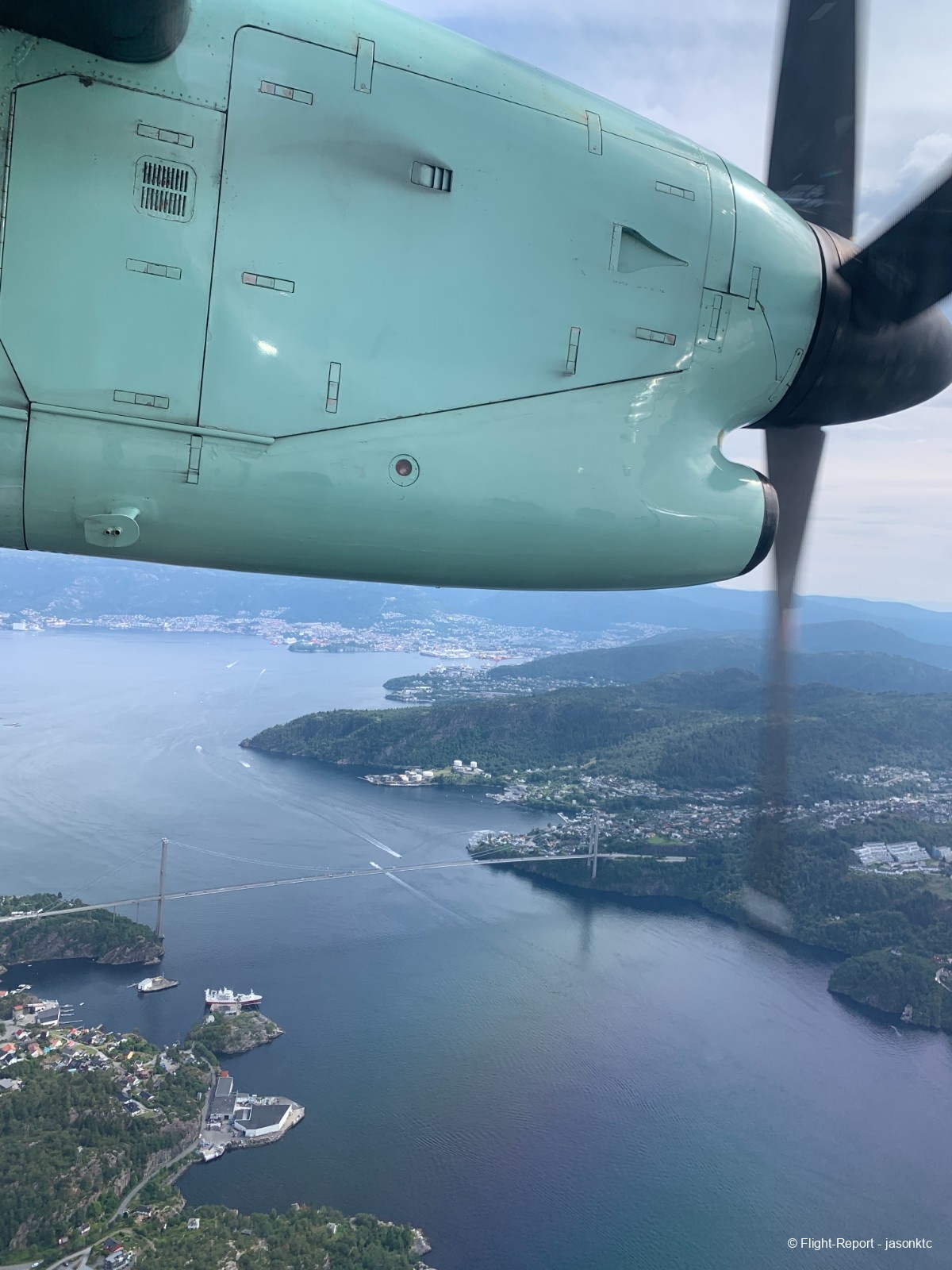
The landing gear was lowered. Feeling a bit excited to see the wheels touching down on the runway later.
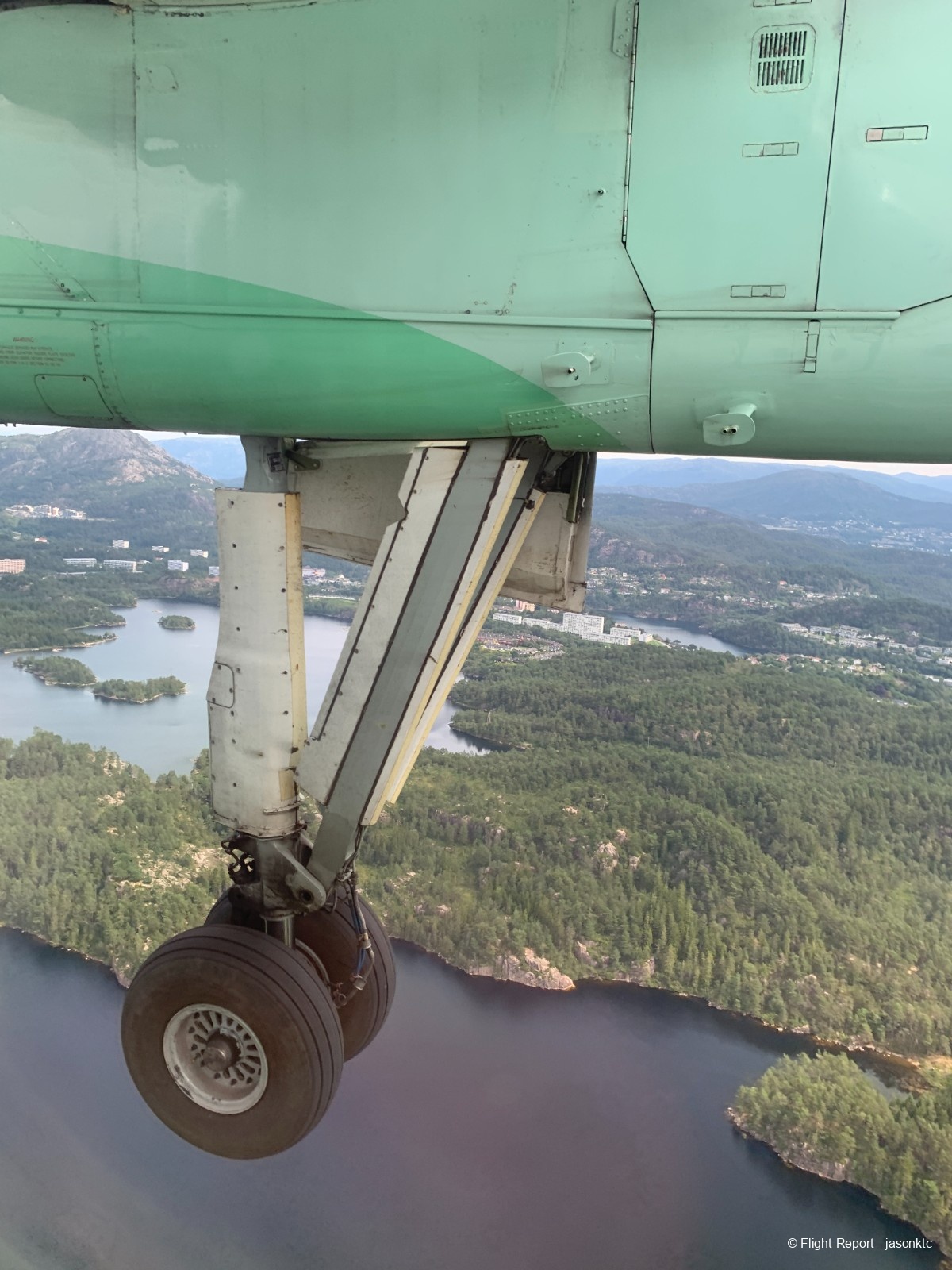
The Haakonsvern Naval Base and its underground dock could be seen on the left before touch down. It is the main base of the Royal Norwegian Naval and the Norwegian Coast Guard. The two vessels I believe are the Coast Guard's Jan Mayen-class vessel.
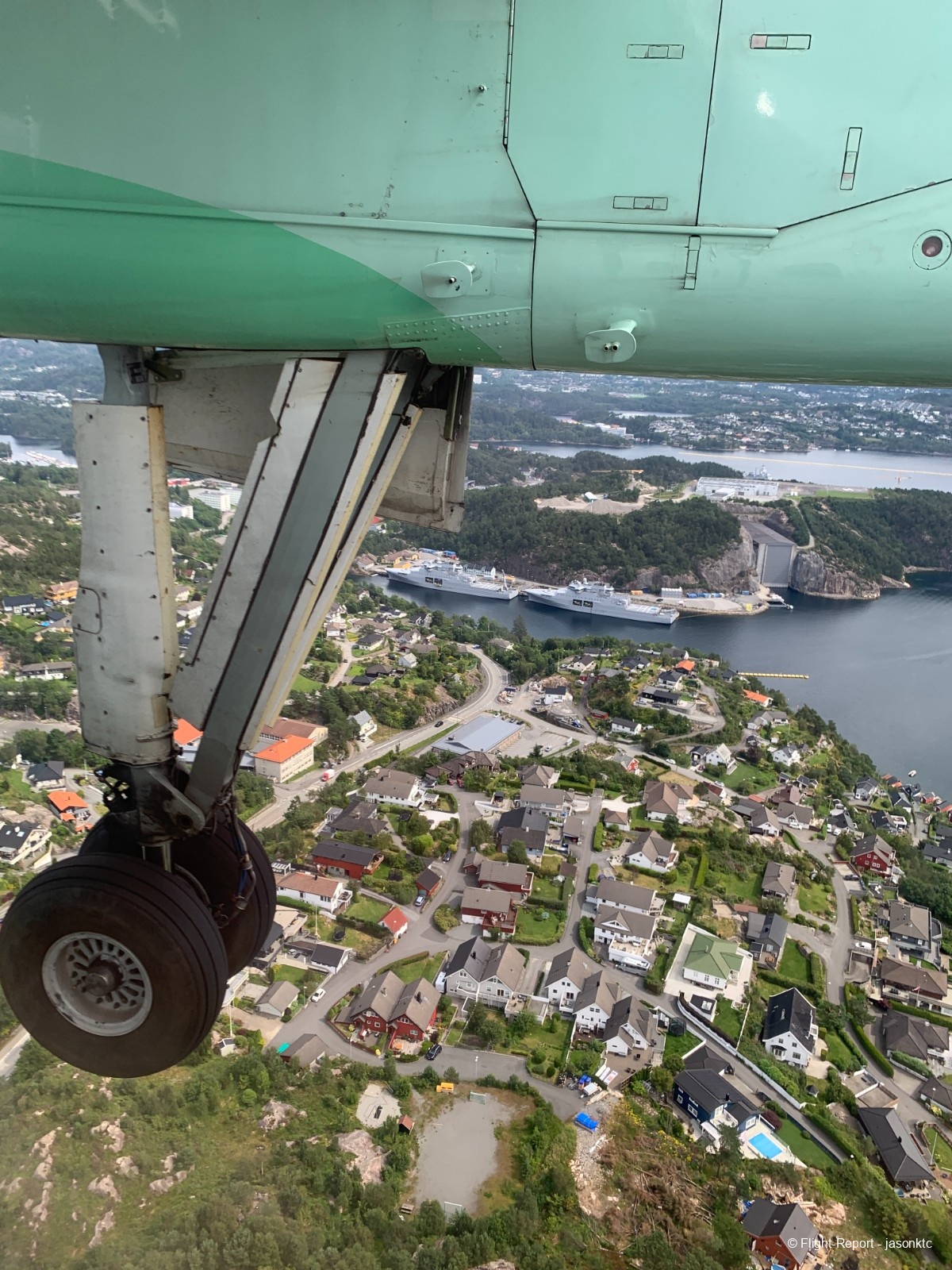
Landing at BGO:
The plane landed on runway 17 at 13:07. Some smoke could be seen when the wheels touched down on the tarmac.
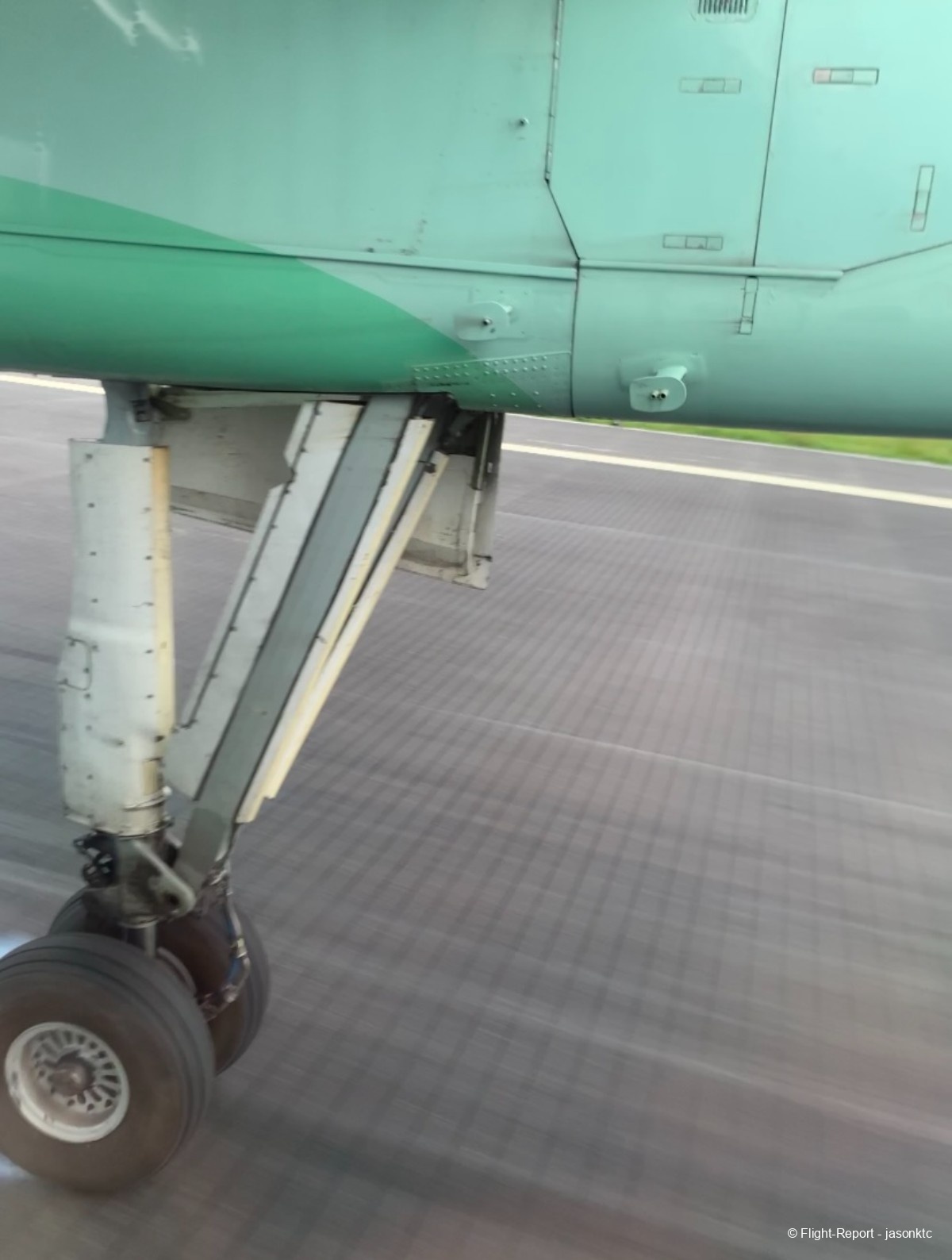
Despite a fairly short taxi, we had to wait for awhile as there was no available remote stands at the time. Eventually at 13:18, the plane parked at gate B20. After disembarking the plane, we had to walk up the stairs of the jet bridge to reach the terminal.
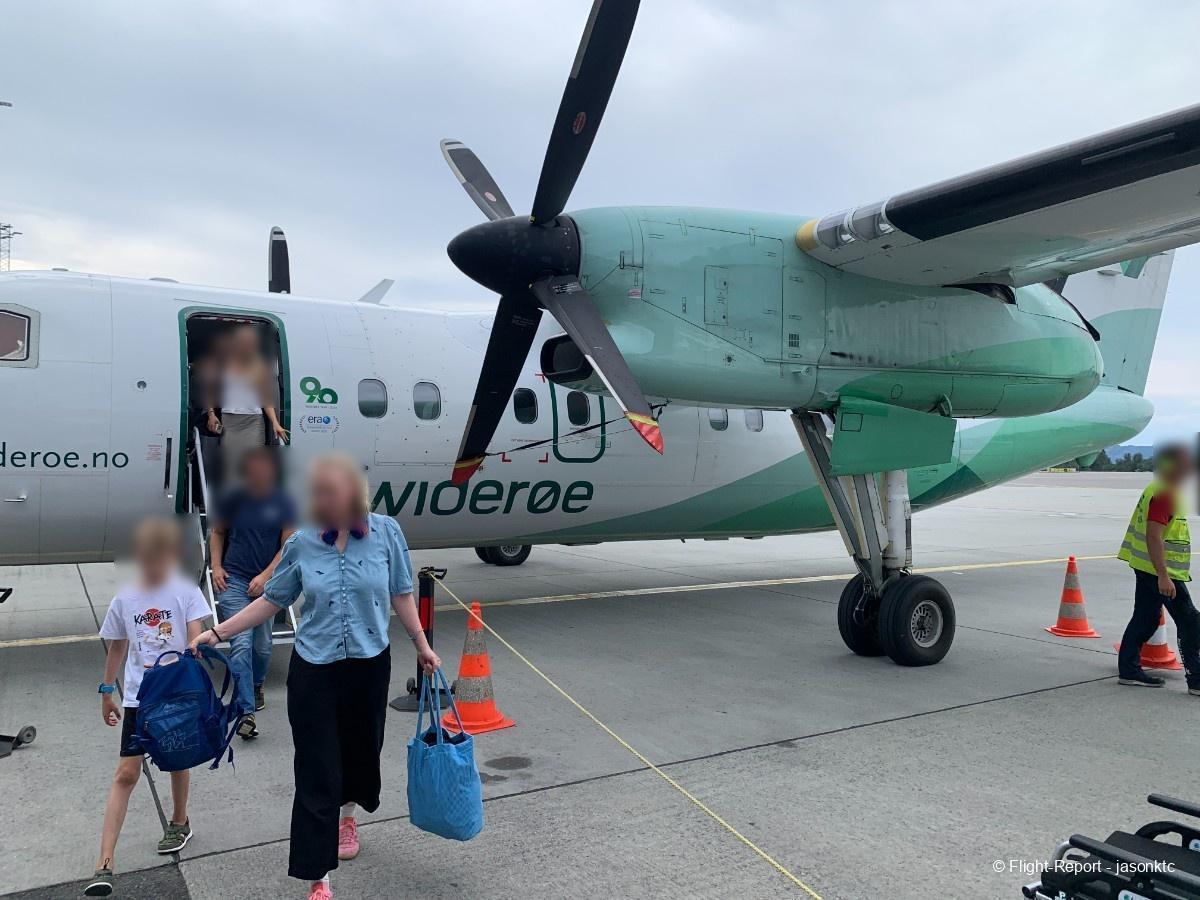
This is the flight path of this flight.
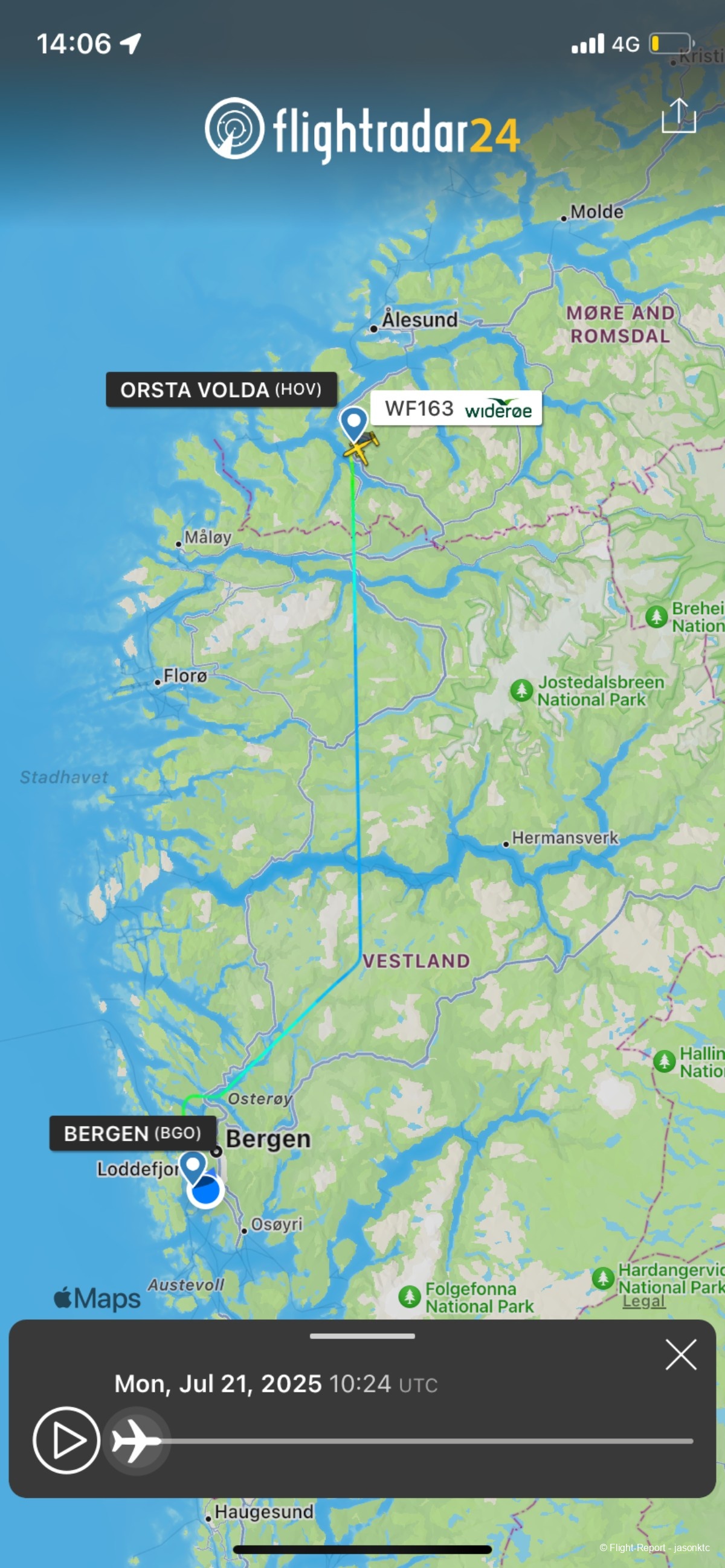
Arrival in BGO:
BGO does not separate its arrival and departure passengers in the domestic terminal. Thus, arriving passengers can also visit the shops and restaurants in the area. The terminal has good amount of natural lighting and a neat Nordic design ambience.
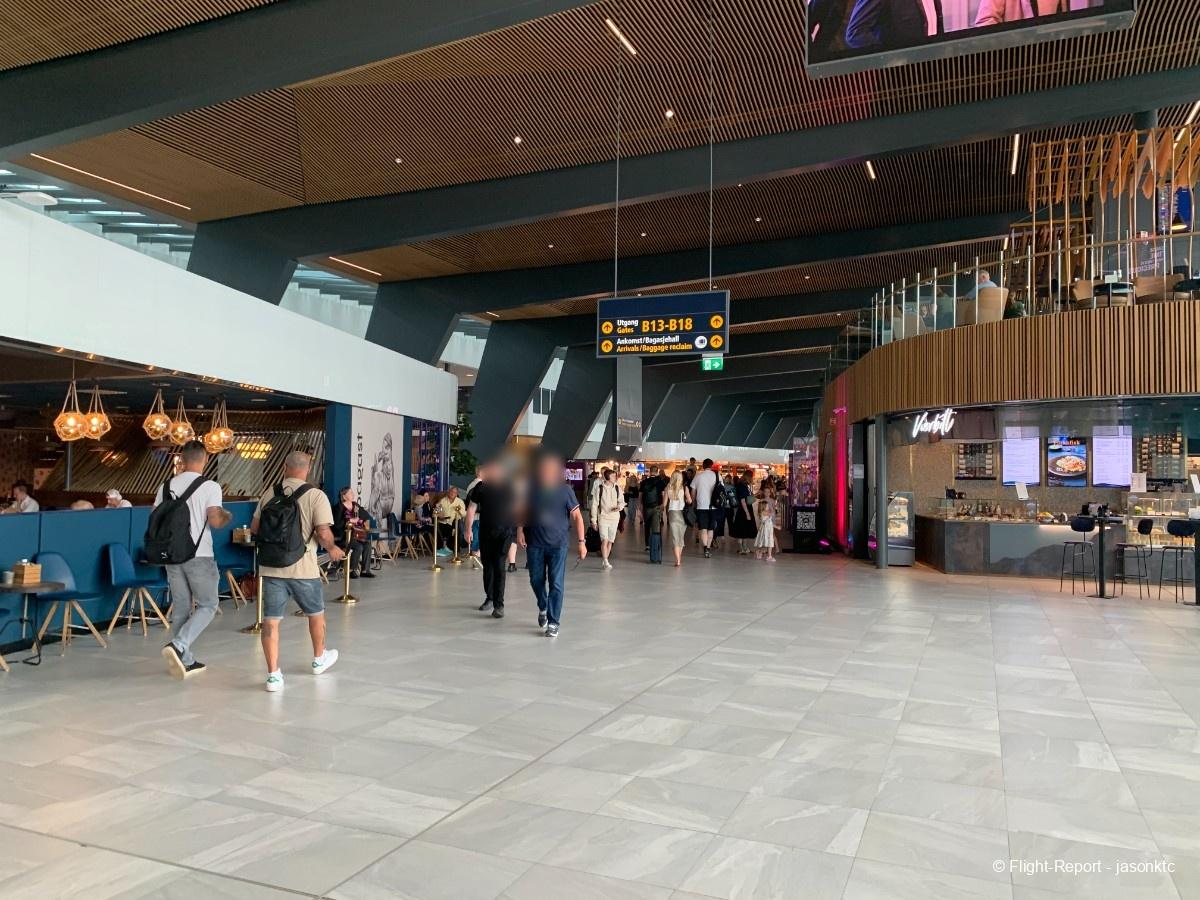
I soon arrived the baggage reclaim area. Quite a lot of domestic flights were allocated to this belt and thus I had to wait for about 10 minutes to collect my checked baggage.
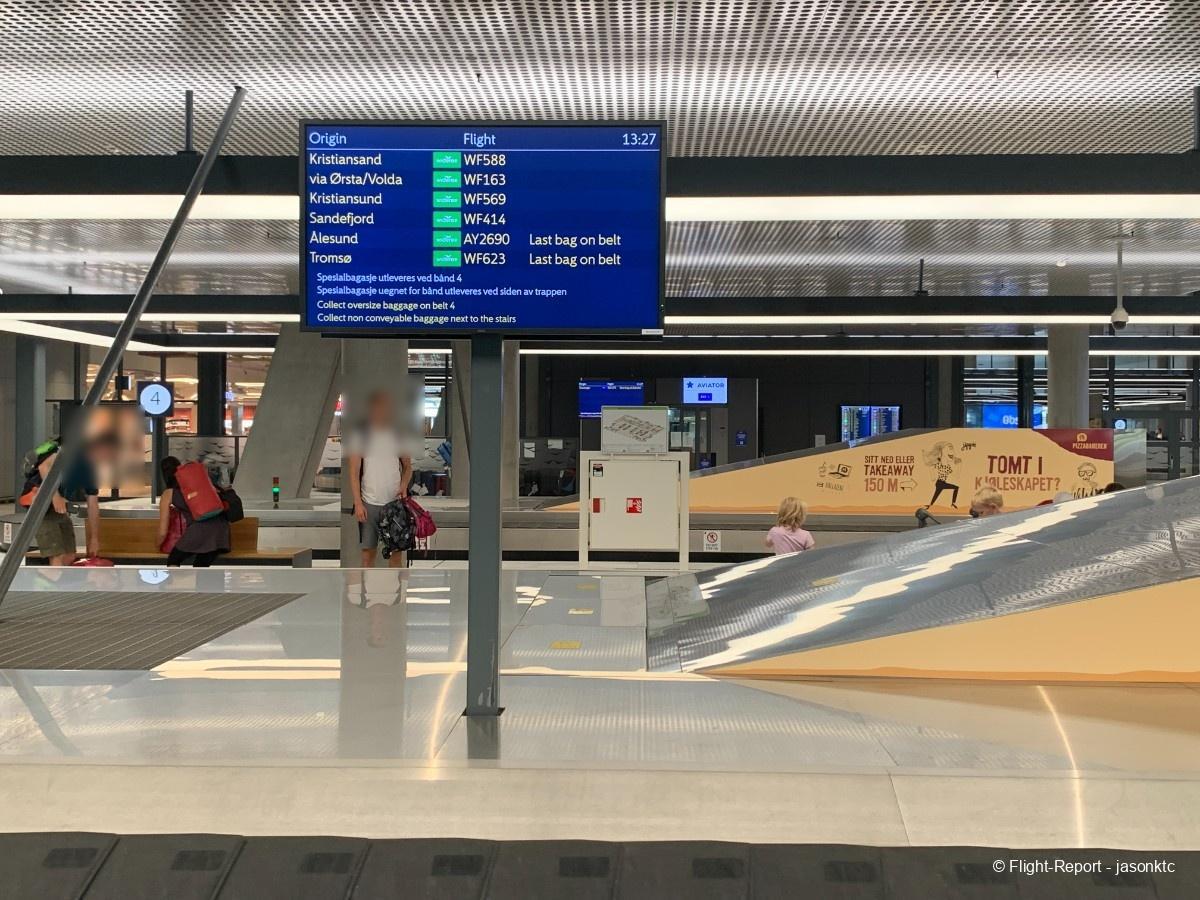
Luckily, the baggage reclaim area is quite bright and clan, with plenty of benches and trolleys. The baggage reclaim area for domestic and international flights are separated by glass partition.
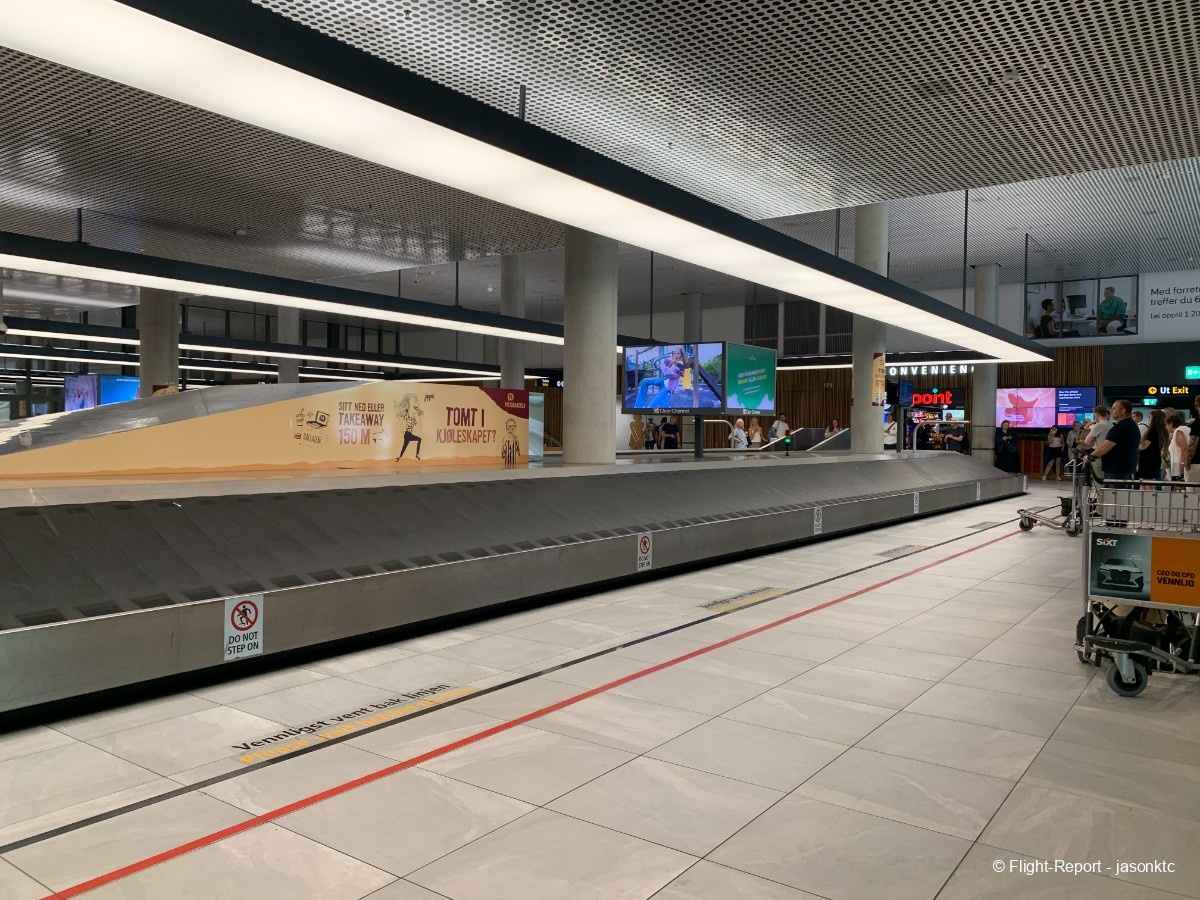
After collecting my baggage, I walked to the underground light rail station. Line 1 of the Bergen light rail connects BGO with the city centre. The journey takes about 45 minutes. The ticket (Zone A) costs NOK 49/ GBP3.6. And just like many transportations in Norway, passengers are encouraged to purchase ticket on mobile app, in this case it is the Skyss app. The below photo was taken when I got off at an intermediate station, Haukeland sjukehus.
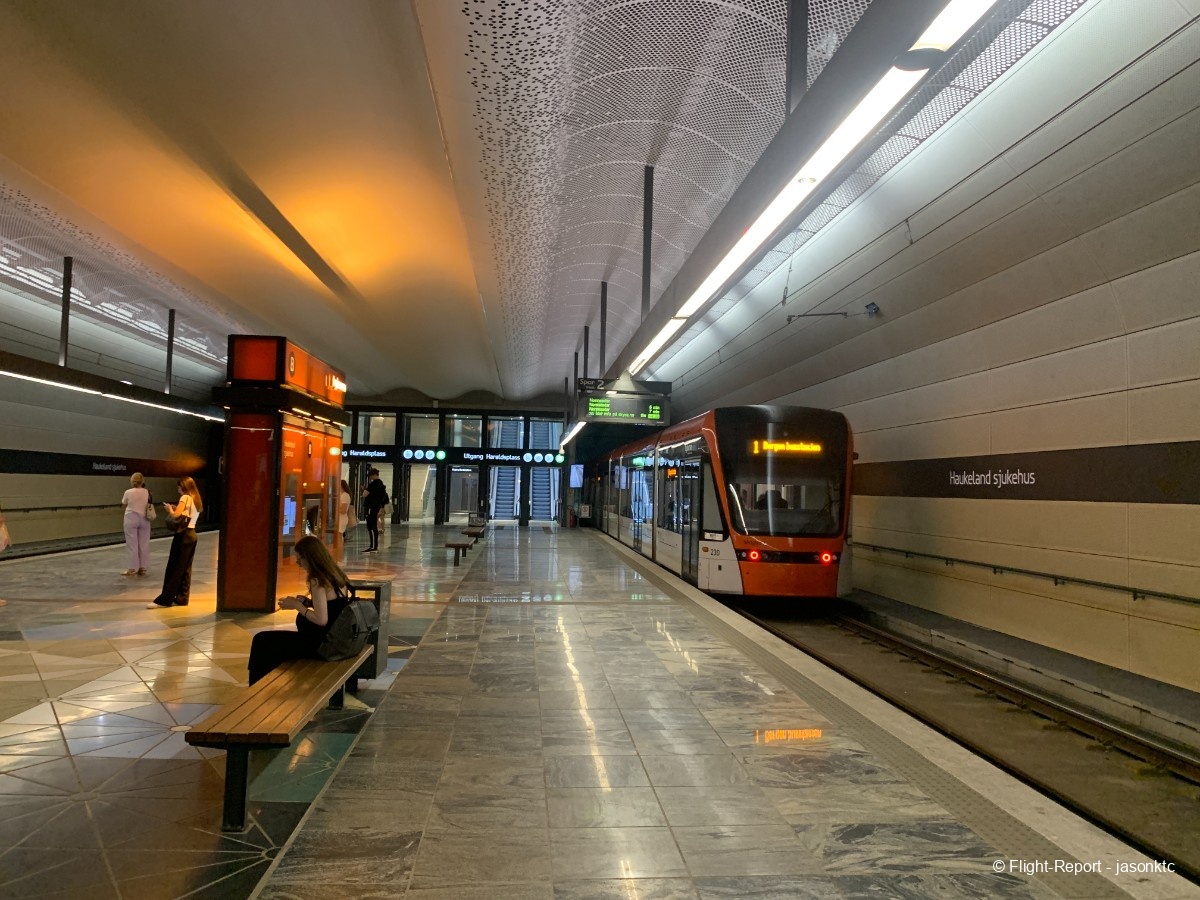

Thanks for this nice FR with a rare plane and stunning views.
Didn't realize Wideroe's operations from Oslo were that limited.
Dear KL651,
Thanks for reading my review and your feedback. It is indeed a rare and interesting plane.
I think Widerøe only operate less than 10 routes from OSL. Its main operations focus around the more rural parts of Norway.